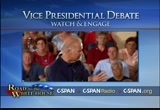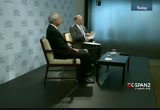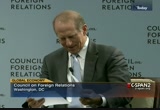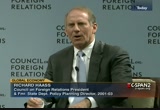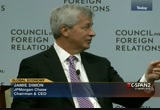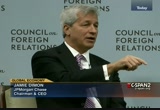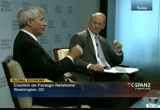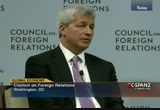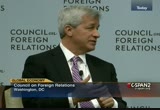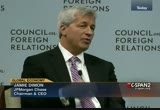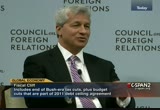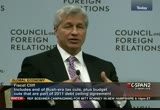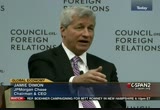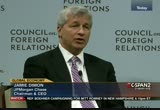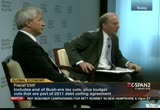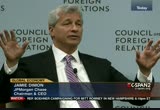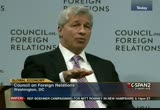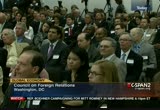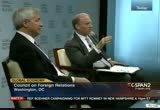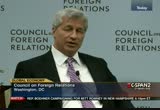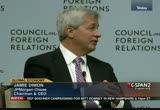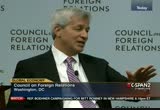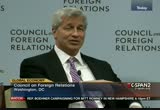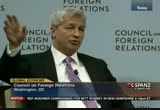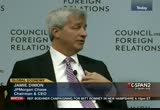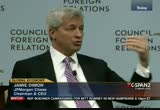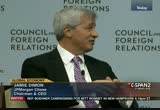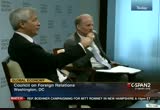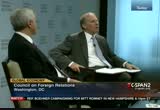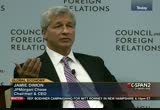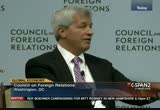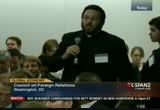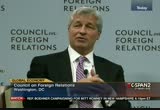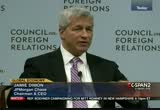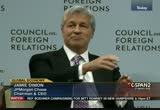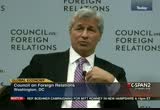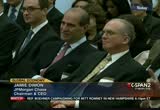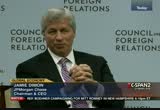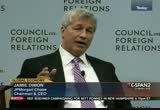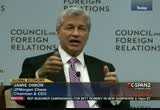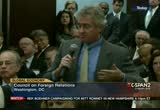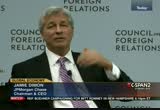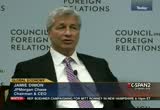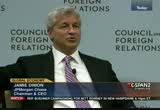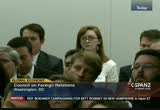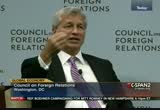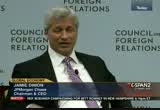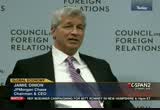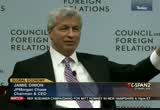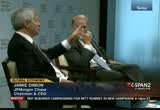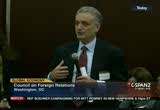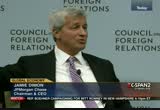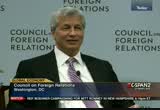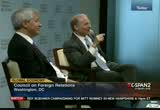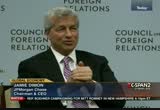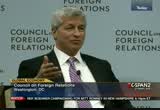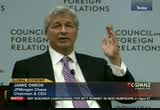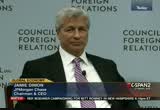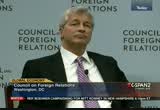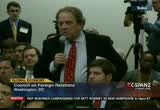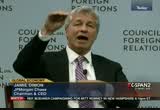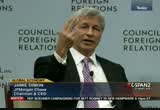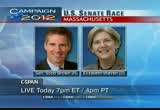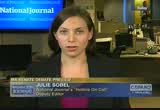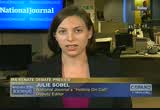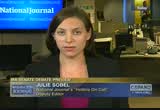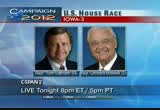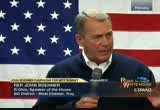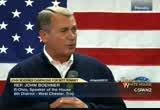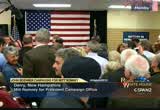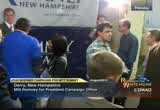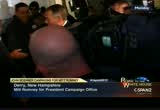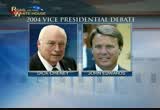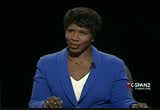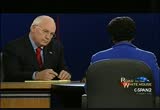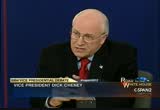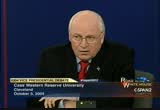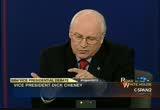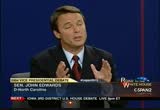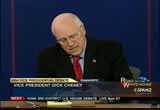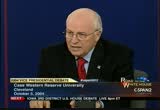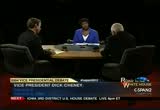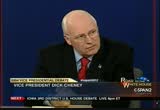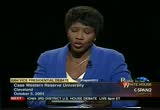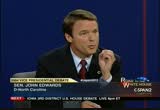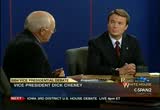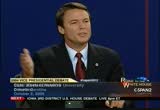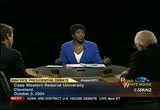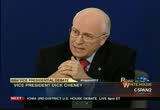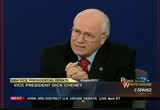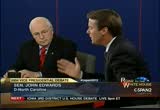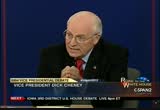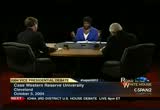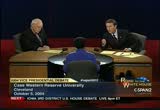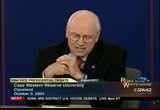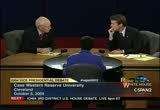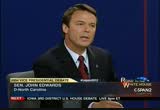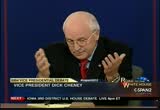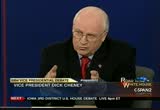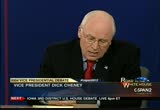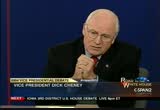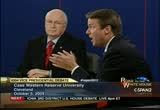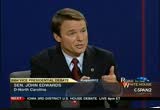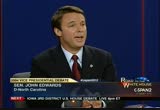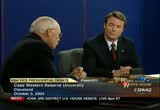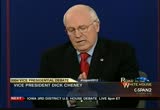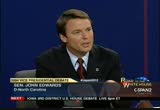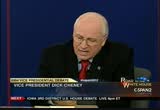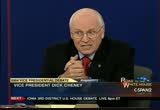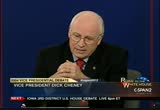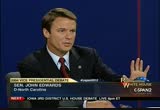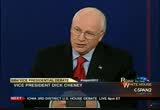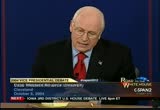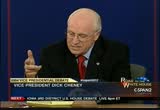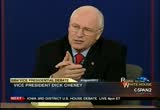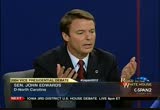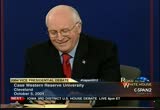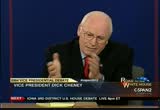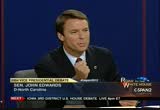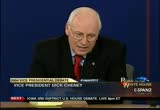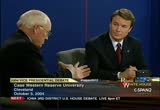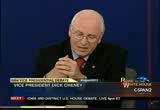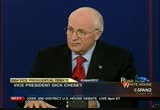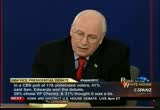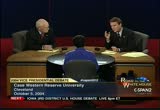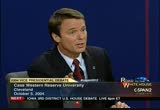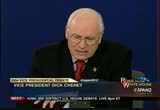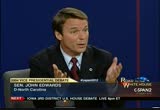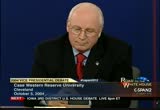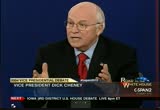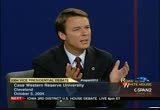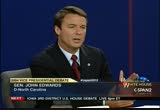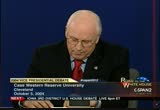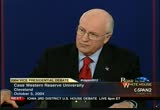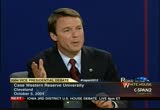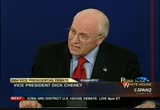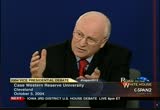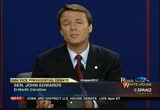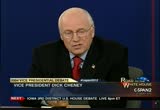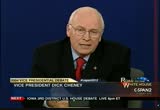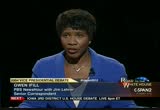tv U.S. Senate CSPAN October 10, 2012 5:00pm-8:00pm EDT
5:00 pm
>> we laid out a $4 trillion debt reduction plan. 4 trillion. we are already passed a trillion of it. ladies and gentlemen, these guys put against everything. no. i really mean it. not only they don't like our plan. i get that. but is your plan? >> congressman paul ryan and vice-president joe biden will face off in their only debate. abc news much erratic moderates. you can watch and engaged with c-span with our live debate preview at 7:00 p.m. eastern followed by two ways to watch the beta nine on c-span both candid sunscreen the entire debate. on c-span2, the multi camera version of the debate of followed by calls, e-mails, and treats. follow live coverage on c-span, c-span radio, an online at c-span.org. >> his company did the federal reserve a favor by buying the
5:01 pm
financial firm bear stearns four years ago. bear stearns was near collapse. his bank lost 5-$10 billion as a result of the purchase. his remarks came during a discussion today with the president of the council on foreign relations. >> i want to welcome all the to the council on foreign relations. today speaker ceo, part of the council on foreign relations corporate program which is supposed said increase the connections between the business community and the foreign policy community which is some extent are one in the same. i also want to thank -- welcome members for those of you in the room. those around the country in the world who are participating in this meeting to the wonders of modern technology. speaking of modern technology, and people would take a second to turn off their cell phones and the like, that would be most welcome. this meeting is on the record. as we say, anything you say can and will, i'm sure, be used
5:02 pm
against you. in this day and age pro with some things you have and several be used against you. >> confidential anymore. >> the phrase someone needs no introduction is often used. hackney in this case that actually applies. not simply the head of one of the principal financial restitution is in this country but i believe has emerged as one of the most important and influential spokesman for the worlds of finance and business in the united states. the way it is going to work today is seen narrowing to have this conversation for a few minutes and then and we will open and up to you all for your questions. let me just give one are to conflict of interest on the table. the corporate member. the council on foreign relations, one of around 175 corporate members, and i am a
5:03 pm
shareholder in the company. unfortunately i am a distinct minority shareholder. i wish it were enough to present a conflict of interest, but is not. of greek heritage. so let's -- the last 24 hours the chancellor of germany has been visiting the country of your ancestors, of your four bears. how worried are you about the prospects for greece cack and what it might mean not just for greece and not just for europe, but the globalization and economic linkages for the estates and indirectly your own institutions . so thank you for the introduction. my ancestors, he can blame me for what's going on there. as a side note i remember my grandfather coming home years ago and yelling and screaming
5:04 pm
about the then prime minister who was the grandfather of the guy a little bit while back. same basic argument. so greece, the issue obviously we all want greece to succeed and survive, but from an economic standpoint greece is not the issue. greece is a couple hundred billion dollars of debt, in the fall to greece or exit of greece on its own is not the catastrophe. the catastrophe is that if you default to greece before you have a firewall to italy and spain you have a very good likelihood you will have a run on the banks in italy and spain. italy and spain don't have the wherewithal to stop a run of the banks. they need the money. they cannot print your wrote. central banks, but they cannot print euro which is a very difficult position, and that is why you need the banking union and the deposit scheme. $708 billion. goes to germany. the deposit.
5:05 pm
and target to, the italian and spanish central banks. so the problem has already been widely socialized. so to solve your puny three things. you need to stop the banking crisis and spain. you need a real fiscal union. they have one that does not work. a lot of people said it would not work, but it was a minority. and they have to do it soon because it is bleeding slowly. want to remind people, there are good reasons for the union. hamas political. hundreds, thousands of years have multiple wars, hundreds of millions of people died so that you could really say, that is a good objective. a political union. the second was an economic union. it was like the united states and say we have a common market, relatives and regulations. such like that. it would be a huge boost and the economy. those still exist. i personally think they're still
5:06 pm
going to muddle through because the alternative is potentially so bad the policy-makers know that. i could be wrong, but hopefully. a rollercoaster. you will see good news, bad news, good news, bad news. is going to work, is that going to work. all the things that they cannot do it once. they have the will because of the politicians say there is no plan be. the ways really complicated. >> let's just keep "running for a second. you have the international financial meetings in japan. one of the things obviously, is the imf predictions for slowdown in global economic growth. alcoa announced this morning they're dropping off the global demand for aluminum which is something of an indicator. are you seeing the same thing in your business operations to make your business around the world, your international institution,
5:07 pm
are you seeing signs of slowdown? >> not quite like that. so europe is in mild recession. you see it. you could argue, but the government spends 50 percent of the money. so 50 percent will not go down, but with asia is slower, but nothing mystical or different than you read about newspapers. the united states is fundamentally stronger than people think in my opinion. under the reasons for that. and latin america, good, bad, slow. obviously it is drawing down quite a bit. >> what about india clearly slowing, china clearly slowing. >> here is china. china is, again, an opinion. i think you're going to need to object to seven or 8 percent growth. it used to be a lot higher. they use that to employ a million people to avoid the social unrest. think you're going to need that
5:08 pm
because you're actually quite right. a change will be smoothed or continue the former policy of the government, but they have the wherewithal to do it. they have $3 trillion in reserves and a lot of capability to maintain growth. they move very quickly. so you may remember, the united states package sent to the crisis. it was like seven months into the crisis stated that month with chile. so they had the ability to move quickly. but i don't believe that china could do that in years from now. now they have an economy they can micromanage. infrastructure building. but just to know where. down the road does not work. the next couple of years. >> as bullish as a lot of other people about africa and latin america? using the signs of a pretty robust economic growth? >> country by country. opening offices. we do business with countries on the ground. but sub-saharan, ghana, kenya.
5:09 pm
remember. multinationals. so a multinational clients. when they go we go. it's not a mystical type of thing. optimistic but country by country. and the same with my america. so columbian, peru, doing fine. brazil slowdown, but there will be making investments in all those countries. and mexico also. actually doing quite well. our neighbor to the south, fiscal deficits. monetary policy. a better job creating jobs and there. as much as we can. >> implicit in all of this, we the united states and not doing as well as we should. let's turn inward. how worried are you and how much are you planning for the fiscal cliff? >> there has is the big deal.
5:10 pm
when the crisis happens, the debt tween crisis, we spend 50 to $100 million preparing. the complexity of that happening in global financial markets, real failure. the fiscal cliff is not quite that because it is more predictable, but we have a fiscal clef. going through to make sure we understand all of it. we will be prepared. j.p. morgan will survive the fiscal cliff. i think it's terrible policy to allow. the reason i think it's bad, there are potential outcomes. i would defy. therefore it is irresponsible policy to say, let's see. lets us see. let's try to avoid that. it won't happen on midnight dec. 31st. it will happen now.
5:11 pm
this is bad. the margin go higher. don't go, don't buy. wait and see. that is a recession. this people pulling back a little bit. >> to you agree? >> going into december 30th. what about the more fundamental thing. the fiscal cliff. a deal. kick the proverbial can down the road. how worried are you that at some point the united states can do something on the order of simpson bowles, $4 trillion over a decade kind of comprehensive deal, how worried are you that one day you wake up and suddenly it's red-hot because the bond market has cecily moved against the estates. >> is virtually assured. it is a short. the question is when and how. and so i cannot honestly.
5:12 pm
two years of five years, but it will happen. it is a matter of time. the united states can of borrowing definitely. you have seen it. if you don't believe me. one hundred years, bankruptcy country after country after country after country who just that the to get away with it because the military power. in know, again, why would you take the choice. we are going to have fiscal discipline. it is imposed upon us. we do the right thing. we do it ourselves the right way. in no way, i think what would an instant growth and jobs. i believe had that been done this economy would be booming. booming. but we have the ability. america knows the way. the more efficient tax system. much more certainty. i still think it is doable.
5:13 pm
when you think of the alliance of something, is it your sense that it does have to include the entitlement reform, spending, control, tax increases. >> that the most people are not partisan or parochial. we can spend -- 21. 21 percent. obviously you have texas. so it's a far more efficient tax system. this huge waste. i call it fiction cost. no society. the legal system. uncertainty. so i think we would have had better growth. for for one or whenever it was. but it wasn't good enough. exactly right. growth will pay for a lot. >> less talk about it.
5:14 pm
the united states has been growing at roughly half what you might call the modern historical rate of economic growth. we are growing just below to giver take. if you are advising the next presidency, in a position to more broadly make the case publicly, coupled with things that we ought to do in order to generate double the rate of economic growth. one would obviously be some kind of a comprehensive budget deal. what else would be on the list? >> let me give you the big picture about america, this great country of ours. the president, whoever he is, should recognize one thing for certain. attitude somehow, will is me, it's just not true. we are travelling around the world. the best military and the planet. the widest in the deepest, most transparent capital markets in spite of what happened.
5:15 pm
i'm talking about in all their glory. venture capital, private equity. the actual market. we have among the best businesses in the planet. small and medium, and large. one of the most around. steve jobs, you name it. we invest more in capital equipment. we have good rule of law. the protestant work ethic is still there. it will be here. so we have to get beyond that. the divine right to success. immigration, fiscal policy. otherwise another gift. and me, my god. looked down and said, i know all that. one more shot.
5:16 pm
so we have a problem. we should diagnose the problem. if you look at america today, corporations are ingratiate. why are we going to 2%? in this one i can't prove. this city is okay. there is a huge wet blanket out here. and to me the uncertainty, real certainty around taxes, policies, fiscal cliff. the debt ceiling fiasco. this constant anti business not just sentiments, but regulatory ag's. wherever i go i have business people. the regulatory environment. they all say it's terrible. it's not just banks. we have done it to ourselves. shoot ourselves in the foot. get rid of that white blanket. and they're is a great --
5:17 pm
printed in the wall street journal. kate president-elect ronald reagan some advice. consistent taxes, regulatory. the same positive story over and over and over, and it will turn. and you have to believe in it. so america is usually going to do the right thing after it has exhausted the possibilities. i'm hoping we do. the important part to me is in washington, if you think that washington and business can go to work with each other and begin, collaboration is what should happen. we should have had collaboration we were in a crisis. every business i know wanted to help. would have pulled together, worked around the clock, but it became a war. we are really getting. so it is another wet blanket. the benefit to make it is right and move on.
5:18 pm
>> list transition. to the extent there has been a marked absence, collaboration, or significant friction between the worlds of politics and business, but the lion's share the responsibility on the political side. >> i would put it on the political and business side. the business ceos, everyone i know is coming down and say what can we do to help. the council, the meetings, none of them even wanted for the first time was surprised me. as the question. 120 see as a big companies. do you want universal health care? 80 percent said yes. we want it done right, a certain way. but there was a huge effort. pull together as americans and make this work, whenever took. it didn't happen. peanut politics better than i do. but it did not happen. it still could. this to it again.
5:19 pm
try again. we owe it to ourselves to do the best we can. >> do no better than i do. historically the pendulum swings. i think there is something of conventional wisdom that the pendulum has swung too far in the direction of under regulation. and the danger is obviously after 2008. still is not gone far enough. where do you come out on that? >> allow the people, opinions and knowledge. whenever fact they find justifies which is not the way. so we need good regulation. good regulation is a good thing. good does not mean necessarily more less. it means good. sixty-five miles-per-hour. you can drink when you drive. those are good things. in some of these we created such confusion over jurisdictions, no
5:20 pm
way to adjudicate disputes. of people to commit fraud cannot make mistakes. attacks by 17 different agencies as opposed to the one. so we need good policy. clarity. we need more. they need more capital. more -- well, okay. capital makes sense. let's have the debate and let the facts. support a lot of capital. i think at one point it will go too far. maybe it is that point. i think some of these are laws not written here. net written for america. for other people for other purposes. of course we want to do it right. i agree with that concept, except it is bad for america. you can't make us. and and not being overly.
5:21 pm
but you look to some of these rules. doesn't make sense. >> what about the poster child or poster issue of proprietary trading and all that? already come out on that? >> after dodd-frank was mostly done and after the blueprint and the white paper and after everyone blew their $0.2 in, then the rule was flown on top. i would argue it is completely unnecessary, totally unnecessary it was not the problem. dodd-frank. we supported a love of dodd-frank in the reform. democrats always make it by neri. you are either for or against it. two dozen things in dodd-frank. i can tell you exactly why. had nothing to do with the crisis. spoke deeply. if you ask me the intent of the law, keep trading safe for big financial companies, i agree with that.
5:22 pm
we have to get rid of too big to fail. so i agree with the intent. so prob trading, we don't do any. what i said and support is we have the widest, deepest, best, most transparent capital markets in the world. my little blackberry. let's not throw the baby out with the bathwater. the struggle is trying to find how you do market making. you almost can't. it's so vague that it is hard to determine what is proprietary, what is market-making. so i just a provided in a way that we end up with the widest and the deepest, industrious capital market. that's my hope. the regulators came out with their 180 things. 18,000 from around the world. american investment banks, but from around the world, asset managers, central banks, governments, just get it right. at one point it has to be a
5:23 pm
dialogue, not just people going into a dark room in deciding what the answer is. >> most regulation come from the outside essentially having a large role so long as is transparent. >> i think you should have regulation that should be designed with practitioners. and this crisis. keep some of the process. and that is kind of a mistake. designing a hospital. keep the doctors out. it would have been better to sit there and have the conversation design improvements to the system. 2000, 5,000 pages of rules. and some of these, by the way, there is a great economic ecosystem for all different types of entities. small banks, big banks. we think certain companies in 50
5:24 pm
countries. that's why we're here. we do a lot of things other people can't. small banks. the pacemaker. >> less talk about that. you mentioned too big to fail. talk that you ought to be broken up. serious financial distress. system threatening because we are beyond institution. how does one deal with that? tremendous data new. your successors. how do we deal with the problem that if j.p. morgan ever made an institution threatening mistake that it would -- the ramifications would be far. >> well, this crisis has nothing to do with class stiegel. remember have -- hedge funds that had problems early on, mortgage brokers, savings and loans went bankrupt, smaller
5:25 pm
banks, lehman and bear stearns, angie, that based gases will time. the happen the way of weather bank. number two, we have to get rid of too big to fail. you know what, you should never pay. you need a way to bankrupt. i prefer bankruptcy. member damaging bankruptcy's for big dumb banks as opposed to this day liquidation. your resolve. we may still be around. recommended chapter 14. specialized. the financial company, all you need, the money keeps in the system. it could be done.
5:26 pm
it has been done quite successfully for a long time. the subdued in their ways to want to structure legally. if j.p. morgan is first to fail and they filed chapter 14 here is what happens. the money keeps them moving. any money that wall, j.p. has $400 billion of equity and unsecured debt, and there is no way we will lose all that. dislike fdic today. the citizens never paid. also, i think when that failure happens, all manager is fired, all directors are fired. the name is buried forever. that way we remember why. so it should not hurt the economy. a group that. those, fixing the problem. j.p. morgan, the reason, we
5:27 pm
offer things. better, faster, cheaper. that is capitalism. productivity, growth enhancement. you buy it. you like it. go to walmart because he let the price just like when you go to a trading desk you like the price. nothing wrong with that. very reasonable. productivity. we did not have productivity we will be living in a tent in buffalo. that is what creates it. some negatives, some problems. you know, something still survive. but look what happened over hundreds of years. a wonderful, beautiful thing. we have to get rid of too big to fail which i think they're very close now. this is what i do think. the elements of that imbedded in dodd-frank. lets companies compete for the marketplace. >> what you just said is you won't get to that point. obviously several months ago you had the derivatives experience.
5:28 pm
the magazine this week. a profile. what is different about risk management? the lessons learned, changes implemented. >> j.p. morgan, '06, 07, 08, nine, 2010, 2011, did not need tart. was there for a lot of people who weren't. hospitals in the schools, businesses. we broke barriers. we brought one move. 15-20000 jobs. a tremendous cost on the fdic which was passed back to the banks. so we made a stupid error. party discipline arrest people, but we made in air. if we did not have this gap elsewhere. we had a gap. we screwed up. and, a billion dollars.
5:29 pm
the stupid error. i could never -- and it was really. it was kind of embarrassing, personally. cigar ship, hundred $50 million in capital. 5 billion in that quarter. companies make mistakes. in airplane crashes. if it doesn't work to stop drug manufacturing. we better be very careful. major conclusions which are not proper. punish us for our mistake which would be a cheryl domestic. independent review. that cab doesn't exist in some places. lessons learned. make mistakes, learn from it,
5:30 pm
and they get better for it. that is what businesses. and only when i come to washington to people act like you're making a mistake that should never happen. of course it happens. academics and politicians, somehow not allowed. [laughter] .. spent approximately $171.6 billion in 2010. about 18 billion of that was
5:31 pm
financed through municipal bond purchases. what it is jpmorgan doing to help faith based organizations borrow to meet our capital needs over the long term? right now is a good climate for us. 1600-years-old we want to borrow now and pay over time. [laughter] >> how much do you want to borrow? [laughter] >> that's a great question. we think that is not the proper topic. i know -- i don't know the actual numbers. i would be happy to share with you and give the the to tell you what we can and can't do. we advise what is and is not reasonable. a bank on the institutions we often have to say no to a client. they will say whenever you have cashed the bank shouldn't because we are getting money you
5:32 pm
shouldn't borrow so if somebody says know we are not going to do it and is not good for you either it's like selling too much liquor. i will give you all the help and all the information you need. >> we will take one minute to talk and that your destination on the large organizations you have the enormous profits. what is your sense of corporate social responsibility. what is jpmorgan defined? >> i've never had a conflict over this. i want in every community that i operate in including greece and spain for a good corporate citizen. no different than the corner store participate in the community in the local church that participates and gives people summer jobs, and we do
5:33 pm
that everywhere. we do it through the seventh largest organization in america in the $200 million a year. corporate social responsibility on environmental. we have programs for the global citizens issue which my friend started here which we are going to lots of cities to help them grow economically and create jobs and helping environment and we do tremendous amount of education. retired in the country retired for the hundred veterans this year and that 78 companies there's 20,000 veterans. they're giving homes which were under the veterans, as we try to participate. and to me it's a healthy vibrant
5:34 pm
company makes it possible. that income as possible, and that's why i turned to michael the time and if i don't make customers happy, they're is no -- i've never separated them. always invest in the future, take care of your own people and clients. let me go back to this issue one more time to read here is a question for you all. we have something like $15 billion of exposure in all the stuff like that and it bounces around to make those 15 in spain. you could easily tell me get it down. i would get it down. we have been in stanford over a hundred years. jpmorgan and fever in italy he
5:35 pm
would say okay, jpmorgan, the year in good times and bad times for me which is what we are doing. the government, the bank, huge corporations. and i know we could lose $546 billion just like that. i will be a drawdown to congress again. spain would go bad. how could you not have known what kind of risk management you had? we made an error this is deliberate. we are going to stay and we know the risks we are bearing right now and we try to moderate them, but we need to be a good corporate citizen. so i simply stand on the shoulders of those that came before. the reputation and the knowledge jpmorgan has and the relationship that goes back 100 years. so we can't cut and they are not going to.
5:36 pm
it would be long-term investors. i will try to get as many people in the front row here. >> mr. dimon, when you look what is the difference and i would like to comment on the issue of oversight. you made a persuasive argument but i haven't heard you use the word oversight. >> when using oversight, we have board and regulators and you say the difference. we do the same thing for consumers and businesses. we raise it in the market i think almost the same so you can say i want to borrow money for this project we may say it will go with public markets and around that is driven if the use
5:37 pm
them in most of the interest rates and foreign exchange so they do a long time to manage exposure. consumers do the same thing. so, we want to your checking accounts, something like $10 trillion a day corporations around the world. but we move it to different currencies and different countries to pay the vendors and again, these are 6,000 corporations and governments around the world. and consumers, too. they give you advice you have savings accounts, checking accounts, investments, mortgages, auto loans. that's what we do. they change 100 years from now you're still going to need financial web fais as a corporation. the services may change. the oversight is very strong and very tough and independent with you as a whole.
5:38 pm
we have regulators and inside jpmorgan chase every business as a risk kennedy we have a 2,000 people rest, 1500 compliance officers in the company to try to manage this. one client that they want or don't want in the way they want. we make markets in the country's about a trillion dollars a day. but you can go to hong kong, london. they can be the columbia republic or gm bonds. research is a great price. you might go to kosko and wal-mart to that of get into
5:39 pm
business we do a great job for you. you say you give me great product and service and ideas that market by the way is in trouble to the fact that ibm can close up right now and raise $5 billion in the bond market in hours directly related we have the capability to do that. >> scurry about with microphones. that would be good. >> i am a risk and performance manager. here is a way of getting at the question of what makes for good regulation. why did they live up to the hope
5:40 pm
that it would keep banks from getting into trouble learning in the mortgage markets and the securitization market when it was passed after the crisis? it's probably a good test case because a was a combination of things as i recall. there's a lot of microregulation that drove everyone nuts and it is one kind of novel idea they felt was interesting which is what the supervisors come and beat for the equity is gone to the managers can't take the risk. so why didn't help forestall the latest financial crisis? astana gets more complex than one thing to read too much leverage in the system and the mortgage market is polluted. as regulatory and political but
5:41 pm
for 30 years of this obscure, much more leverage, so like i said, fannie mae and freddie mac was a huge disaster dragging me down but i would love to see someone go through what happened there. how can cost $200 million by the way. it's not going to cost you anything. so, i think that we should go through all those things and ask what we can do better. so, what we want in the oversight committee to agitate the cyber responsibility to problems and the people responsible for we felt it should be a better bankruptcy failure resolution for the big banks and we've always believed in more capital liquidity and in transparency. we allow them to go to the clearing houses. but again a clearing house does not eliminate risk.
5:42 pm
>> there in the back. >> mengin companies make mistakes now there is a civil lawsuit with bear stearns to related fraud. do you regret participating in the federal reserve to 2008. >> did you miss something when you told investors that the acquisition wouldn't be material let's get this right we are asked to it at a great risk to ourselves and we have the capability of due diligence. the one thing i was worried
5:43 pm
about is all these lawsuits there would be no lawsuits, no stock drop lawsuits or class-action lawsuits or more deutsch lawsuits but we brought it and the second we brought it we knew that we were buying something. i read extensively what life knowing what i know today? it's close. it's really close. what i know today is of the called me to do something like that i couldn't do it but you take on these obligations. i did get a letter from the senior regulators before we signed it to save please, take into consideration when you want to come after us down the road where bear stearns did by the federal government of the economic and financial. some great people and some terrible ones and it got the
5:44 pm
exact number. i put this under the unfair category i am a big boy. i will survive. but i think the government should think twice before everything something goes wrong. mitigation, write-downs, and the finance and the fed we did not invest in great mortgages. we took the investment-grade mortgages we have more leverage i didn't want to create another giant in the marketplace. we could hold these things to borrow at 0 percent we can get them that are making multibillion-dollar profit. multi-billion.
5:45 pm
talking about borrowing, are you always in the course of your career inflations are going to become issue number one for you? >> you talk about planning. again, people talk about basing the treasury to 175 might move to two or 250. i want to point out they've done a magnificent job and one come to country added together is $3 trillion so far. there is far more stimulus than
5:46 pm
that. it was gdp every year, so i think the economy -- things were in pretty sad shape and there's a lot of fiscal monetary on the ground is too much cash overseas i'm holding more cash and stuff like that. so yeah, if you have real growth. so i think it is the best case and worst case. the best case is we start to grow 4%. you know, capacity goes up, inflation goes to 3%, 3.5% stimulus. they would go to five and go to three. >> it's possible by the way to the not growing but used it to see inflation and we've had that in this country.
5:47 pm
>> it's good fiscal policy. it's good fiscal policy, folks. that is what is going to kill this thing if we don't get our act together on controlling our fiscal deficit in the future. >> bringing some corporations in the favor of change and taxation. >> the corporate taxation system doesn't work and i try to say -- it's like a real time in the books this time it's a long time getting at. if you read the fine for six examples it is a good policy. it didn't have to be that way. they could make it a junior to say it could have been a lot better. we could have made this a lot better. one of the things this taxation. we are driving immigrants to get
5:48 pm
trained here and they're sent back, and we are driving the capitol of the margin but if you're building a semiconductor plant or shipbuilding plant, the data center were the research center, it doesn't have to be here. in a lot of it is over there because the tax is lower and the repatriation tax which makes it 30 or 40% higher. that is economics. a separate morality to economics, said that the economic system to produce it to grow and conducive to jobs and gdp and have a conversation about taxation. i don't mean to leave to mind paying for the 9.6% taxes and my cat and gain being at 20%. i want a more society which is getting more equitable don't give up the economic engine and made it possible and that is
5:49 pm
what we were doing and you can talk to them all day long it's called anecdotally and there would be academic to bring it overseas and the problem with about by the way is the would make the investments overseas for people over there and some may stay. >> i have had numerous conversations with people i consider very intelligent to say something like this to me. we have to return glass-steagall, or we have to basically restrict the banks from taking any positions in a variety of securities in their bread-and-butter and i tell them you can't underwrite without making markets. it just passes over their head. it seems to me that the industry itself, maybe it is because of the political dent that creates the poster sectioned could do a
5:50 pm
better job explaining to the average american's what your business is and when you are required to do to make the business work to the customer. what do you think? >> you want to do a better job do a better job exploring some of these things. a lot of people say things they don't know and understand and it's incumbent upon the leaders to politicize things in the sake of politics and i didn't realize this, punish me for this, too. when they said that all of the bank's failed, it was over. that was it. if you believe that -- some is justified, but that of predicated it would have failed.
5:51 pm
you almost can't defend yourself at all. those are not true. they all eventually failed. wells fargo and all of the regional banks out there. they didn't need the talks to succeed they were trying to make loans and do what they had to do for america. so it's hard to make the case. i don't know how to do it but i'm not willing to give up. i love this country too much to get i'm not going to give up. that's why do so many things like this and talk about the most transparent capital markets and in that letter where i get help right behind you in fact, and my wife, but describes capital markets. what is the market making. aluminum, brass -- grass. all right, this market making
5:52 pm
come from china and the soviet union? the markets in cuba. if you can sell your goods for a better place, go over there. that's what people do. it's not like there is a morality to reassert teaching people all the wrong things but they should be fixed. we should be punished for what we've done wrong and should fit the crime so we can move on and i do think that's it feels like old testament justice. what they saw they filled out and they include the banks that fail and there is some truth to that. there is some truth to that. i make to the to can't make up with the board's did and didn't do. they destroy their companies, virtually recognize lost $50 million.
5:53 pm
pisses meal from too. estimate to the old testament -- [laughter] am i for and i was at innovation, it was their punishment shouldn't exceed the crime so it was a progressive innovation at that time. [laughter] >> i didn't think of it that way, but okay. >> about four years ago the chief security officer of one of the major houses in new york told us they had been up to 1 million attempted intrusions', cyber intrusions in one day. how concerned are you about the cyber threat, cyber terrorism? >> we get hundreds of thousands a day, major securities centers in the governments around the world a lot of it is the denial of service getting into the computers in iran. they say you can't get through. so it's not that they aren't
5:54 pm
getting inside computers. somehow jpmorgan spent a tremendous time and we worked closely with every government in favor of the new cybersecurity law. but we think that you've done it in collaboration, it's not only to set up where you felt to be cyber secure to not come after you, we need your help. the cia, the nsa, the department of defense, they know it's at the border sometimes come and we don't. so, the businesses have to work together in this to protect the american public so that we can stop cybercrime. but it's a big deal and it is going to get worse. computers and ten years would be faster and the calculations would get through quicker to meet that in every way, shape and form. the banks are pretty good at this. they wouldn't do this along time and all of the rules and regulations, but how many of you worry about that?
5:55 pm
it's the ciders to becoming over the internet. everything we do we know more about some of that stuff and you think but think of the person that knows your company from inside. that's what we are going to get. so. >> thank you for that reassuring point. there is a young lady in the second to the last row. >> how do you protect yourself from any one individual getting access. >> daniel douglas from the washington post. many of the rules under dodd-frank have to be written, so i'm wondering how much of an impact is the current regulatory environment having on your business? >> so, to separate the business, okay, if you look at the quarter it's pretty good. small business loan, 12th straight months, the market share is up and investment
5:56 pm
banking, trading devotee, mortgage loans are up and problems are coming down so actually pretty good. if you talk about -- mabey 25% has been done. it's really helping to calculate overhead and we get listed brussels and it's a contradictory overlapping. all i want is to sit down and have a conversation but what do we need for safety and satisfied that and creating the burden and that is to be higher the smaller you are in my opinion. thinking the collaboration to get it done. it's not going to get done properly with each other. the most important capital and liquidity for the three injured
5:57 pm
98 other roles. but you should know we are trying to work with everyone accommodating. we have no choice. we have to accommodate and we are going to do it. we are going to do it in a way and the spirit and under the law. that is what we are going to do. it doesn't mean we won't comment on that or comment at all we would need the terms required. and another conversation should be jpmorgan would be fine no matter what the and just believe me. i am worried about the country. we should do these things right for america, not jpmorgan. >> time for one last question their. >> we apologize for the many people with their hands up. it's just the demand exceeds supply in that market problem.
5:58 pm
>> thanks. on a white the mitchell report. i want to ask you arguably a two big to fail question that this is not about jpmorgan chase or barclays. it's about the u.s. and china. china is on the brink of a major change in its leadership. it has written its own sort of prescription for new economic directions which they know they have to initiate or the too will fall off the cliff. we may or may not be looking at a major change in leadership in this country. but we are looking at the fiscal cliff and i wonder from your perspective fenster somebody who does business all around the world, and despite your protest about not really knowing much about politics how you assess the relative chances of success for america dealing in the short term with its fiscal clef and with its ability to get some a
5:59 pm
semblance of good government and with the chinese to be jindal to do the same and make their changes in their economies of the two largest economies in the world stay online. >> they've got to bring out the democracy. democracy started as a man over a certain property. 90 million people count as a party vote. every society is middle class create something in the democracy over time. and it's hard. and they're worried about losing control. and they've got to bring out their economy. think of the financial system as kind of the spin wheel. not the most important thing in the economy, but people, investors and insurance individuals need vehicles wrecked in projects and companies and start-ups and venture, on and the come and
6:00 pm
they cannot down the road. they have things to go through. we as the united states should help them do that. it's in our interest that they grow and we can take care of the 1.3 billion people, etc.. they are going to complain, but i would defend this and the strategic economic battle. we have to do that. it's the right thing to do. ..
6:01 pm
>> it's the moral freedom called democracy and rule of law and rights and those things. you go to china, and they look at america and how lucky we are to have those things and the businesses and why do we complain about our situation? they are in a tougher situation. we have to help them, but be strong. never give up on our strengths which is economic, military, and moral. >> folks, thank you very much. >> thank you, appreciate it. [applause] [inaudible conversations] >> massachusetts republican senator scott brown and his
6:02 pm
democratic challenger, elizabeth warren debate tonight. see it live on our companion network, c-span, at 7 eastern. we spoke to a reporter about the race. >> host: joined by national journal who previews the debate. julie, this is not the first time the candidates or that seat will be squaring off with two debates under their belt so where do things stand? >> well, the first two debates in this race have been pretty eventful, nasty debates, and the race is pretty positive up until september. there's the ban on outside group ads in the massachusetts senate race. both candidates agreed to so there's no negative outside ads, and until september, no negative ads from either candidate as well. over the last month or so, it's
6:03 pm
really taken a turn towards the negative, and in the first two debates, scott brown, the republican senator from massachusetts, went after elizabeth warren on her claims of native american ancestry, trying to imply she may be benefited and got teaching jobs or got into school based on her claims of being a minority. he's gone after her on legal work, particularly on behalf of travelers' insurance saying she prevented as asbestos victims fm getting money. she's hitting scott brown on that mass voters want a democratic controlled senate. he's a republican. he's a well-liked guy. people consider him an independent guy, but a vote for
6:04 pm
scott brown is a vote for a republican controlled senate. >> host: what should they watch for at 7 p.m. tonight? >> guest: well, i think it's a pretty safe bet that scott brown will continue to attack warren on the travelers' insurance thing. basically, her big -- her campaign basically central theme is she's fighting for the middle class, the little guy, and so what he's trying to do with this is say, you know, she works for a corporation, travelers' insurance, and that her work prevented victims of as asbestos poisenning from getting the payouts they deserve. she disputed that claim saying that her work was to benefit the victims, but he is, you know, it's fairly muddy waters on that. what she'll have to do is defend that work and i assume he'll
6:05 pm
attack on it again. we can probably assume the native american thing will come up as well, and, you know, from elizabeth warren's perspective, i think tieing him to mitt romney, supports mitt romney, but -- and nit mitt is unpopular in massachusetts. i think you'll see her try to remind viewers that he supports mitt romney, not president obama, and in the last debate, scott brown would not commit to voting to mitch mcconnell for senate majority leader if re-elected, but i think she'll try to tie him to the national republican party. another thing that happened in the last debate was scott brown was saying as a model supreme court justice, that scalia was the conservative justice, a model for him, and warren's campaign hit hard on that trying to bring up talk of, you know, important job of a senator is to
6:06 pm
confirm supreme court justice nominees, and scott brown said this conservative is an ideal justice for him. >> host: you touched on this a little bit, but why are people paying attention to the race? >> guest: it's one of the closest races in the country. scott brown is just one of two vulnerable republican incumbent senators up for re-election this year. the other is dean heller in nevada. it's been tight in polls over the last year, and then scott brown has been ahead in some over the last month or several weeks at least. warren has, you know, gotten a little of an advantage in polls, and we've seen consistently her being a few appointments up over scott brown. there was one poll out this week which would be, you know, considered encouraging for brown, showed him up again, possibly, and apparently as a result of romney's debate
6:07 pm
performance, former governor in the state, unpopular, assured of losing the race there, but most polls show him lagging obama by a huge margin. he's made up ground against obama and showed scott brown was now up against warren. we expect the race to be one of the closest races in the country. >> host: all right. jew lill, we'll touch base with you later in the program. thank you very much. >> guest: thank you. >> the massachusetts senate debate live tonight at 7 eastern on c-span coming from us whsn tv in springfield, massachusetts. at 8 eastern, a debate between two sitting congressmen, tom latham and democratic senator boswell. the two have been put in the
6:08 pm
6:09 pm
that gavel is pry it from my cold stone hands. [cheers and applause] you heard people in the political circles talk about the upcoming election over the course of your lifetime being the most important election of their lifetime. well, guess what, they were wrong. the most important election of our lifetime happens this november because the american people can't handle four more years of president obama's economic policies. [applause] his policies have failed. they've actually made things worse, and as a result, they can't run on his record so they try to run on everything but their record. last wednesday night, i thought governor romney did a great job. [cheers and applause] it was clear to me he worked hard during the practice rounds to make sure he was on the ball. when the president, you know, had some inaccuracies --
6:10 pm
[laughter] governor romney pointed them out respectfully and politely and lay facts out in front of the american people. the other thing is if you watched the debate closely, is romney came back to the economy, come back to the economy, and back to the economy. why? because the american people vote with their wallets. this is an election about getting our economy going again and getting the american people back to work. mitt romney's created hundreds of thousands of jobs and understands how to create jobs and also understands what big government can do to destroy jobs in the country. having him out there with his plan and talking about his plan and staying focused on the plan is exactly what needs to happen. as i like to say, he made the sale the other night, and he made the sale in a big way. [cheers and applause] you know, there's a big battleground poll that came out
6:11 pm
today, democrats and republican pollsters do polls together, and 73% of the people in the battleground poll -- well, this was the gallop poll this morning, 73% of the people who watched the debate thought that mitt romney won. [applause] how about this? how about 63% of the democrats who watched the debate thought that romney won. [applause] listen, i'm just a regular guy with a big job. a lot of you don't know, but i have 11 brothers and sisters, and my dad owned a bar, all right? i'm the last guy in the world who wanted to be a member of the congress, much less a speaker, but i, like all of you, grew up in america, a country where you can grow up and be anything you want to be and do anything you want to do. i was lucky enough to work through school, got into a small business and buy it and grow it into a successful business. along the way, i got involved in the neighborhood's homeowner's
6:12 pm
association and i ended up as speaker of the house. this, too, could happen to you. [laughter] i got involved because i thought time for people from the real world to take an active interest in the government. when i went there as a small business person 22 years ago, i went to fight for a smaller, less costly, accountable government. i don't feel one bit differently today about who i am or why i'm there. to fight for a smaller, less costly, more accountable federal government. tell you what -- [applause] we live in the greatest country the world's ever known. why? because americans had the freedom to succeed, the freedom to innovate, the freedom to try, and, yes, we've also had the freedom to fail. that freedom served our country well, and it's created thousands and millions, if you will, opportunities for all of our citizens. none of us would be here today if we didn't live in a country like this that providedded those opportunities for all of us.
6:13 pm
our job, those of us elected and thous in the room, our job is to ensure the kids here have the same -- look happy -- [laughter] we have to make sure the kids have the same opportunity that we had, and to do that, that means we have to have an economy that's growing, creating opportunities for all of our citizens. god bless you. keep up the great work, and god bless america. [cheers and applause] [inaudible conversations]
6:18 pm
>> here in cleveland, ohio. i'm from the news hour and washington week on pbs, and i welcome you to the first and thw only vice presidential debate between vice president dicki cheney, the republican nominee, and senator john edwards, thek democratic nominee.r these debates are sponsored by the commission on presidential debatesment tonight's lasts 90 minutes following detailed rules of engagement rules they have devised for themselves to the best of my ability. the questions tonight will be divided between foreign and domestic policy, but the specific topics were chosen by me. the candidates have not been
6:19 pm
told what they are. the rules, for each question there can only be a two-minute response, and a 90-second rebuttal and at my discretion a discussion extension of one minute. a green light will come on when 30 seconds remain in any given answer, yellow at 15, red at five seconds and then flashing red means time is up. there's also a backup buzzer system if needed. the candidates may not direct questions to one another. there will be two min closing statements but no opening statements. there is an audience here in the hall, but they have been instructed to remain silent throughout. the order of the first question was determined by the candidates in advance, and the first one goes to vice president cheney. vice president cheney, there have been new developments in iraq, especially having to do with the administration's handling. paul bremer gave a speech in which he said we have never had enough troops on the ground,
6:20 pm
donald rumsfeld said he has not seen any hard evidence of a link between al qaeda and saddam hussein. was this a report that you requested that you received a week ago that showed there was no connection between al-zarqawi and saddam hussein? >> i want to thank you and i want to thank the folks here at case western reserve for hosting this tonight. this is a very important event and they've done a superb job of putting it together. it's important to look at all of our developments in iraq within the broader context of the global war on terror. and after 9/11 it became clear we had several things to have a successful strategy to win the global war on terror, specifically that we had to go after the terrorists wherever we might find them, that we also had to go after state sponsors of terror, those who might provide sanctuary and safe harbor. and we also had to finally stand up to democracies afterwards because that was the
6:21 pm
only way to guarantee these states would not again become safe harbors for terror or development of deadly weapons. the concern about iraq specifically focused on the fact that saddam hussein had been for years listed on the state sponsor of terror, they had established relationships with a terrorist out of baghdad. he paid $25,000 to families of suicide bombers b and he had established relationships with al qaeda. specifically, a look at george tenet, c.i.a. director two years ago when he talked about a 10-year relationship. the effort we mounted with respect to iraq focused specifically on the possibility that this was the most likely nexus between the terrorists and weapons of mass destruction. the biggest threat we face today is the possibility of terrorists smuggling a nuclear weapon and a biological agent and threatening the lives of hundreds of thousands of americans. what we did in iraq was exactly the right thing to do. if i had it to recommend all
6:22 pm
over again, i would recommend exactly the same course of action. the world is far safer today because husband saddam hussein is in jail. his government is no longer in power and we did exactly the right thing. >> senator edwards, you have 90 seconds to respond. >> thank you, gwen for moderating this debate and thank you for case western and all the people of ohio for having us here. mr. vice president, you are still not being straight with the american people. i mean, the reality, you and george bush continue to tell people first that things are going well in iraq. the american people don't need us to explain this to them. they see it on their television every single day. we lost more troops in september than we lost in august. we lost more in august than we lost in july. we lost more in july than we lost in june. the truth our men and women in uniform have been heroic. our military has done everything they've been asked to do. and it's not just me that sees the mess in iraq.
6:23 pm
there are republican leaders like john mccain, like richard luger and chuck hagel who says it's getting worse. why? richard lugel said it's because of the administration. they didn't have a plan to win the peace. they also didn't put the alliances together to make this successful. we need a fresh start. we need a president who will speed up the training of the iraqis, get more staff in for doing that, we need to speed up the reconstruction so the iraqis see some tangible benefit. we need a new president who has the credibility, which john kerry has to bring others into this effort. >> would you like 30 seconds to respond? >> i would. with eve made significant progress in iraq. the government has been in power now for only 90 days. the troop additional troops is talked about frequently, but the point of success in iraq
6:24 pm
will be reached when we have turned governance over to iraqi people. they've been able to establish a democratic government. they will have free elections next january for the first time in history. we also are actively rapidly training iraqis to take on security responsibility. those steps are successful. they're well under way and i'm confident that, in fact, we'll get the job done. >> mr. vice president, there is no connection between the attacks of september 11 and saddam hussein. the 9/11 commission has said it. your own secretary of state has said it, and you've gone around the country suggesting that there is some connection. there's not. and in fact, the c.i.a. is now about to report the connection between al qaeda and saddam hussein is tenous at best. and in fact, secretary of defense said yesterday that he knows of no hard evidence of the connection. we need to be straight with the american people. >> time for a new question but the same topic. this time to you, senator
6:25 pm
edwards. you and senator kerry have said the war in iraq was the wrong war at the wrong time. does that mean if you had been president and vice president that saddam hussein would still be in power. >> here's what it means. it means that saddam hussein needed to be confronted. john kerry and i have consistently said that. that's why we voted for the resolution. but it also means it needed to be done the right way. and doing it the right way meant that we were prepared -- we gave the weapons inspectors time to find out what we now know, there were no weapons of mass destruction, that we didn't take our eye off the ball, which are al qaeda, osama bin laden, the people who attacked us on september 11. now remember, we went into afghanistan, which, by the way, was the right thing to do. that wases the right decision. our military performed terrifically there. but we had osama bin laden cornered at tora bora. we had the 10th mountain division available. we had the finest military in the world on the ground and
6:26 pm
what did we do? we turned -- this is the man who masterminded the greatest mass murder and terrorist attack in american history. and what did the administration decide to do? they gave the responsibility of capturing or killing osama bin laden to afghan warlords who just a few weeks before had been working with osama bin laden. our point in this is not complicated. we were attacked by al qaeda and osama bin laden. we went into afghanistan and very quickly the administration made a decision to divert attention from that an instead began to plan for the invasion of iraq. and these connections -- i want the american people to hear this very clearly. listen carefully to what the vice president is saying because there is no connection between saddam hussein and the attacks of september 11. period. the 9/11 commission has said that's true, colin powell has said it's true. but the vice president keeps
6:27 pm
suggesting that there is. there is not and, in fact, any connection with al qaeda is tenous at best. >> mr. vice president, you have 90 seconds to respond. >> the senator has his facts wrong. i have not suggested there's a connection between iraq and 9/11. but there's clearly an established iraqi track record with terror. and the point is that that's the place where you're most likely to see the terrorists come together with weapons of mass destruction, the deadly technologies that saddam hussein had developed and used over the years. the fact of the matter is that -- the big difference is they are not prepared to deal with states that sponsor terror. they've got a very limited view about how to use u.s. military force to defend america. we heard senator kerry say the other night that there ought to be some kind of global test before u.s. troops are deployed pre-emptively to protect the united states. that's part of a track record that goes back to the 1970's when he ran for congress the first time and said troops should not be deployed without u.n. approval.
6:28 pm
then in the mid 1980's, he ran on the basis of cutting most of our major defense programs. in 1991, he voted against desert storm. it's a consistent pattern over time of always being on the wrong side of defense issues. a little tough talk in the midst of a campaign or as part of a presidential debate cannot obscure a record of 30 years of being on the wrong side of defense issues. and they give absolute no ibbed case based on that record of being willing to go forward and aggressively pursue the war on terror with the kind of strategy that will defeat our enemies and will guarantee the united states doesn't get attacked by the likes of al qaeda. >> we'll get back to that topic. tonight we mentioned afghanistan. we believe that osama bin laden is hiding perhaps in a cave somewhere along the afghan-pakistan border. if you get a second term, what is your plan to capture him? and then to neutralize those who have sprong up to replace him? >> when we have -- we've never
6:29 pm
let up on osama bin laden from day one. we've actual live pursued him. we've captured thousands of al qaeda in various places around the world and especially in afghanistan. we'll continue to very aggressively pursue him and i'm confident eventually we'll get him. the key to success in afghanistan has been again to go in and go after the terrorists, which we've done and also take down the taliban regime which allowed them to function there. in effect, sponsors, if you will, of the al qaeda organization. scombron edwards 2 half years ago, six months after we went into afghanistan announced that it was chaotic. the situation was deteriorating, the war lords were about to take over. here we are, 1/2 years later, we're four days away from a democratic ele, first one in history in afghanistan. we've got 10 million voters who have registered to vote. nearly half of them women. that election will put in place democratically-elected government that will take over
6:30 pm
in december. there's been enormous progress in afghanistan, despite of what john edwards said 2 1/2 years ago. they just got it wrong. the fact is as we go forward in afghanistan, we will pursue osama bin laden and the terrorists as long as necessary. we're standing up to afghan security forces so they can take on responsibility for they're own security. we'll keep u.s. forces there. we have about 16,000 there. as long as necessary to assist the afghans in terms of dealing with their security situation. but they're makinging is cant progress. we've got president karzai is in power. they have done wonders of writing their own constitution for the first time ever. schools are open, young girls are going to school. women are going to vote, women are even eligible to run for office. this is major, major progress. there will be democracy in afghanistan. make no doubt about it. freedom is the best ant dote to terror. >> senator edwards, you have 90 seconds to respond. >> someone did get it wrong, but it wasn't john kerry and
6:31 pm
john edwards. they got it wrong. when we had osama bin laden cornered, that -- they left the job to the afghan war lords and diverted their attention from the very people who attacked us, who were at the center of the war on terror and osama bin laden is still at large. i want to go back to something the vice president said just a minute ago because these distortions are continuing. he said that -- made mention of this global test. what john kerry said, and it's as clear as day to anybody who was listening, he said we will find terrorist where is they are and kill them. before they ever do harm to the american people first. we will keep this country safe. he defended this country as a young man. he will defend this country as president of the united states. he also said very clearly that he will never give any country veto power over the security of the united states of america. now, i know the vice president would like to pretend that wasn't said an the president would, too. but the reality is it was said. here's what's actually happened
6:32 pm
in afghanistan, regardless of this rosesi scenario they paint on afghanistan, just like iraq. what's actually happened is they're now providing 75% of the world's opium. not only are they providing 75% of the world's opium, large parts of the kuhn country are under direction of war lords. big parts of the country are still unsecure. and eastern afghanistan where osama bin laden is is one of the hardest places to control and the most insecure. >> mr. vice president? 30 seconds. >> 20 years ago, we had a similar situation in el salvador, we had guerrilla insurgency controlling a third of the country, 75,000 people dead and we held free elections. i was there as an observer on behalf of the congress. the human drive for freedom, the determination of these people to vote was unbelievable. and as the terrorists would come in and shoot up polling places, as soon as they left, the voters would come back and get in line and would not be
6:33 pm
denied their right to vote and el salvador is a lot better because they held free elections. it will apply in afghanistan as well as in iraq. >> the vice president just said we should focus on state sponsors of terrorism. iran has moved forward with its nuclear weapons program. they are more dangerous today than they were four years ago. north korea has moved forward with their nuclear weapons program. gone from one to two nuclear weapons to six to eight nuclear weapons. this vice president has been an advocate for over a decade for lifting sanctions against iran, the largest state sponsor of terrorism on the planet. it's a mistake. we should not only not lift them, we should streppingen those sanctions. >> new question to you, senator edwards but i don't want to let go of the global test question first because i want people to understand exactly what it is senator kerry did say. he said you've got -- he was asked about pre-emptive action. he said "you've got to do it in a way that passes the test,
6:34 pm
passes the global test where your countrymen and people understand what you're doing, why you're doing, and you can prove to the world you did it for legitimate reasons." what is a global test if it's not a global veto? >> let me first, he said in the same segment, point blank, we will never give anyone a veto over the security of the united states of america. what he's saying is we're going to go back to the proud tradition of the united states of america and presidents of the united states of america for the last 50 to 75 years. first, we're going to actually tell the american people the truth. we're going to tell them the truth about what's happening. we're not going to suggest to them things are going well in iraq or any place else when, in fact, they're not. we're going to make sure the american people know the truth about with ear using force and what the explanation is. and not just the american people. we're also going to make sure we tell the world the truth. because the reality is for
6:35 pm
america to lead, for america to do what it's done for 50 years before this president and vice president came into office, it is critical that we be credible. it is critical that they believe that when america takes action, they can trust what we're doing, what we say, what we say at the united nations, what we say in direct conversations with leaders of other countries. they need to know the credentialn't of the united states is always good because they will not follow us without that. and unfortunately we're seeing the consequences of that right now. it's one of the reasons that we're having so much difficulty getting others involved in the effort in iraq. you know, we've taken 90% of the coalition casualties. american taxpayers have borne 90% of the cost of the effort in iraq. we see the result of there not being a coalition. the first gulf war cost america $5 billion. we're at $200 billion and counting.
6:36 pm
john kerry will never give control over the security of the united states of america to any other country. we will not outsource our responsibility to keep this country safe. >> mr. vice president, you have 90 seconds to respond. >> well, gwen, the 90% figure is just dead wrong. when you include the iraqi security forces that have suffered casualties, as well as the allies, they've taken almost 50% of the casualties and operations in iraq, which leaves the u.s. with 50%, not 90%. with respect to the cost, it wasn't $200 billion. you probably weren't there to vote for that, but the $120 billion is, in fact, what has been allocated to iraq. the rest is for afghanistan and the global war on terror. the allies have stepped forward and agreed to reduce and forgive iraqi debt to the tune of nearly $80 billion by one estimate. that, plus $14 billion they promised in terms of direct aid
6:37 pm
puts the overoverall allied contribution at about $95 billion. not to the $120 billion we've got, but better than 40%, so your facts are just wrong, senator. you also have a situation where you talk about credibility. it's awfully hard to convey a sense of credibility to allies when you swrothe voted for the war and then you declared wrong war, wrong place, wrong time. you voted for the war and then you voted against supporting the troops when they needed the equipment, the fuel, the spare parts the ammunition and the body armor. the inconsistencies you and john kerry have cited time after time after time. whatever the political pressure at the moment requires, that's where you're at. you've not been consistent. >> senator edwards, you have 30 seconds. >> what the vice president has just said is a complete distortion. the american people saw john
6:38 pm
kerry on thursday night. they don't need the vice president or the president to tell them what they saw. they saw a man who was strong who had conviction, who was resolute, who made it very clear that he will do everything that has to be done to find terrorists, to keep the american people safe. he laid out his plan for success in iraq, made it clear that we were committed to success in iraq. we have to be because we have troops on the ground there and because they've created a haven for terrorists. >> mr. vice president, you have 30 seconds. >> your rhetoric, senator, would be a lot more credible if there was a record to back it up. there isn't. and you cannot talk tough during the course of a 90-minute debate in a presidential campaign to obscure a 30-year record in the united states senate and prior to that by john kerry who has consistently come down on the wrong side of all the major defense issues that he's faced as a public official.
6:39 pm
>> mr. vice president, a new question for you. you have two minutes to respond. when the president says senator kerry is emboldening enemies and you say we could get hit again if voters make the wrong choice in november, are you saying it would be a dangerous thing to have john kerry as president? >> i'm saying i don't believe he has the qualities we need in a commander-in-chief because i don't think based on his record that he would pursue the kind of aggressive policies that need to be pursued if we're gong to defeat these terrorists. we need to battle them overseas so we don't have to battle them here at home. i'm not challenges john kerry's patriotism. i said in my acceptance speed at the republican convection that we respect his service in vietnam and i got applause for that. we've never criticized his patriotism. what we question is his judgment and his judgment is flawed. and the record is there for anybody who wants to look at it. in 1984 when he ran for the senate he opposed or called for the elimination of a great mp major weapon systems that were crucial to the cold war and are important today to our overall forces. when saddam hussein invaded kuwait and occupied it in 1990
6:40 pm
and 1991, he stood up on the floor in the senate and voted against liberating kuwait and pushed saddam hussein back to iraq. the problem we have is that if you look at his record, he doesn't display the qualities of somebody who has conviction. and with respect to this particular operation, we've seen a situation in which first they voted to commit the troops, send them to war. john edwards and john kerry. then they came back and when the "was whether or not you provide them with the resources they needed, they voted against it. i couldn't figure out why that happened initially. and then i looked and figured out was howard dean was making major progress with the democratic primaries based on an anti-war record so they in effect decided they would cast an anti-war vote and they would vote against the troops. if they couldn't stand up to the pressures howard dean
6:41 pm
represented, how can we expect them to stand up to al qaeda. >> senator edwards, you have 90 seconds to respond. >> a long resume does not equal good judgment. we have seen over and over the misjudgments made by this administration. i want to go back to what the vice president just said because it's a continuation of the things they've been doing, unfortunately, on the campaign trail. a continuation of what began his first answer with tonight. john kerry has voted for the biggest military appropriations bill in the country's history. john kerry has voted for the biggest intelligence appropriations in the country's history. this vice president when he was secretary of defense cut over 80 weapons systems, including the very ones he's criticizing john kerry for voting against. these are weapons systems, a big chunk of which the vice president himself suggested we get rid of after the cold war. the reality is that john kerry
6:42 pm
has consistently supported the very men that he served with in vietnam. it was clear at the time of that vote that they had no plan to win the peace. we're seeing the consequences of that every day on the ground right now. we stood up and said for our troops, we must have a plan to win the peace. we also thought it was wrong to have a $20 billion fund out of which $7.5 billion was going to go towards no-bid contract for halliburton, the vice president's former company. it was wrong then, it's wrong now. >> mr. vice president you have 30 seconds. >> well, gwen, i think the record speaks for itself. these are two individuals who have been for the war when the headlines were good and against it when the ratings were bad. we have not seen the kind of consistency that a commander-in-chief has to have in order to be a leader in
6:43 pm
wartime in order to be able to see the strategy through to victory. if we want to win the war on terror, it seems to me it's pretty clear the choice is george bush and not john kerry. >> john kerry has been absolutely clear and consistent from the beginning that we must stay focused on the people who attacked us, that saddam hussein was a threat that needed to be addressed directly, that the weapons inspectors needed to have time to do their job. had they had time to do their job they would have discovered what we now know, that, in fact, saddam hussein had no weapons. that, in fact, saddam hussein has no connection with 9/11. that, in fact, saddam hussein has little or no connection with al qaeda. >> senator edwards, new question to you and you have two minutes to respond. part of what you have said and senator kerry have said you're going to do in order to get us out of the problems in iraq is to internationalize the effort. yet french and german officials have both said they have no intention, even if john kerry is elected of sending any
6:44 pm
troops into iraq for any peacekeeping effort. does that make your effort, or your plan to internationalize this effort seem kind of naive? >> let's start with what we know. what we know is that the president and the vice president have not done the work to build the coalition that we need. dramatically different than the first gulf war. we know they have the done it and they can't do it. they didn't, by the way, just reject the also lice leading up into the war. they also rejected them in the effort to do the reconstruction in iraq. and that has consequences. what we believe is, as part of our entire plan for iraq, and we have a plan for iraq. they have a plan for iraq, too. more of the same. we have a plan for success. and that plan includes speeding up the training of the military, we have less than half of the staff that we need there to complete that training. second, make sure that the reconstruction is sped up in the way that iraqis see tangible benefit to what's happening. and by the way, if we need to,
6:45 pm
we can take iraqis out of iraq to train them. if it's not secure enough, so dangerous on the ground they can't be trained there, we can take them out of iraq for purposes of training. we should do whatever has to be done to train the iraqis and to speed up that process. that works in conjunction with making sure the elections take place on time. right now, the united nations which is responsible for elections in january has about 35 people there. now, that's compared with a much smaller country like east timor where they had over 200 people on the ground. you need more than 35 people to hold an election in cleveland. much less in iraq and they keep saying the election is on schedule, this is going to happen. the reality is, we need a new president with credibility with the rest of the world and who has a real plan for success. success breeds contribution, breeds joining the coalition. not only that, i want to go back to what the vice president said. he attacks us about the troops. they sent 40,000 american troops into iraq without the
6:46 pm
body armor they needed. they sent them without the armored vehicles they needed. while they were on the grown fighting they lobbied the congress to cut their combat pay. this is the height of hypocrisy. >> mr. vice president, you have 90 seconds. >> gwen, it's hard to know where to start, there's so many inaccuracies there. the fact of the matter is the troops wouldn't have what they had today if you guys had your way. we talk about internationalizing the effort. they don't have a plan basically. it's an echo. you made the comment that the gulf war coalition in 1991 was far stronger than this. we had 34 countries then and 30 today. it's hard after john kerry refered to our allies as the coalition of the coerced and the bribed to go out and persuade people to send troops and to participate in this process. you end up with a situation in which you talk about the meaning, in effect, the
6:47 pm
sacrifice of our allies, and say it's wrong war, wrong place, wrong time, by the way, send troops. makes no sense at all. it's totally inconsistent. there isn't a plan there. our most important ally in the war on terror in iraq specifically is prime minister allawi. he recently addressed the joint session of congress, that i presided over as speaker of the house and john kerry rushed out immediately when his speech was over with when he came and thanked america for our pledge and sacrifice and pledged to hold elections in january and demeaned him, criticized him, challenged his credibility. that is not the way to win friends and allies. you'll never had to the coalition with that kind of attitude. >> senator edwards. >> thank you. the vice president suggests we have the same number of countries involved now than in the first gulf war. the first gulf war cost the american people $5 million. we're at $200 billion and counting.
6:48 pm
not only that, 90% of the coalition casualties, mr. vice president, the coalition casualties, are american casualties. 90% of the cost of this effort are being borne by american taxpayers. it is the direct result of the failures of this administration. >> mr. vice president. >> classic example. he won't count the sacrifice and the contribution of our iraqi allies. it's their country, they're in a fight, increasingly putting their necks on the line to take back their country from the terrorists and the old regime elements that are left. they're doing a superb job and for you to demean their sacrifices is -- >> i'm not -- >> it is, indeed, what you suggest, they shouldn't count because you want to say the americans are taking 90% of the sacrifice. you cannot succeed in this effort if you're not willing to recognize the enormous contribution the iraqis are increasingly making to their own future. we'll win when they take on
6:49 pm
spont for governance which they're doing and their own security, which they're increasingly doing. >> new question, similar topic because i want to circle back to a ke which i'm not quite sure we got an answer to. senator edwards, the question of american intelligence. if the report we read about today is true and if vice president cheney ordered about it and asked about this, do you think in the future your administration or the bush administration would have sufficient and accurate enough intelligence to be able to make decisions about where to go next? >> let me speak first on what the vice president just said, then i'll answer that question. this unfortunately -- what the vice president is telling people is inconsistent with everything they see every single day. it's a continuation of well, there's a strong connection between al qaeda and saddam hussein. it's not true. it's the continuation of at least insinuating that there's
6:50 pm
some connection between 9/11 and saddam hussein. it's not true. it's saying to the american people as the president said last thursday and the vice president continues to say tonight, that things are going well in iraq. contrary to what people who have been there have seen, including republican leaders, contrary to what everyone in america sees on their television every day. americans are being kidnapped. people are being beheaded, parts of the country under the control of insurgents even today under the control of the insurgents. the vice president still has not said anything about what mr. bremer said about the failure to have adequate troops, the failure to be able to secure the country in the short term. you know, remember shock and awe? look at where we are now. and it's the direct result of the failure to plan, the failure to have others involved in this effort. this is not an accident. now, let me go back to your question. if we want to do the things that need to be done, to keep this country safe, we can't be
6:51 pm
dragged, kicking and screaming, to it. one thing that everybody does agree on is that 9/11 did change things. but what's happened is this administration opposed the creation of a 9/11 commission to find out why it happened and what we needed to do. they opposed the creation of a department of homeland security. and then they were for it. we can't react that way. we must be more aggressive. when john kerry is president of the united states, we are committed to immediately implementing all of the reforms suggested by the 9/11 commission so that we have the information we need to find terrorists and crush them before they hurt us. >> mr. vice president. >> when the story that appeared today about this report is one i asked for, i asked an awful lot of questions. that's part of my job as vice president. a c.i.a. spokesman was quoted in that story as saying they'd not yet reached the bottom line and there's still debate over this question between the relationship between al zarqawi
6:52 pm
and saddam hussein. the report also points out that at one point some of zarqawi's people were arrested, saddam hussein supposedly intervened. let's look at what we know about mr. al zarqawi. he was running a terrorist camp, training terrorists in afghanistan prior to 9/11. we know when we went into afghanistan he didn't migrate into baghdad. he set up shop in baghdad and oversaw a pois sons facility where the terrorists were developing ricin and other deadly substances to use. we know he's still in baghdad today. he is responsible for most of the mayor car bombings that have killed or maimed thousands of people. he's the one you will see on the evening news beheading hostages. he is without question a bad guy. he is a terrorist. the fact of the matter is this
6:53 pm
is exactly the kind of track record we've seen over the years. we have to deal with zarqawi by taking him out and that's exactly what we'll do. >> mr. vice president, in june of 2000, when you were still c.e.o. of halliburton, you said that u.s. businesses should be allowed to do business with iran because, quote, unilateral sanctions almost never work. after four years as vice president now, and with iran having been declared by your administration as part of the axis of evil, do you still believe we should lift sanctions on iran? >> no, i do not. and, gwen, at the time i was talking specifically about this question of unilateral sanctions. what happens when we impose unilateral sanctions is, unless there's a collective effort, other people move in and take advantage of the situation and you don't have any impact expect to penalize american companies. we've got sanctions on iran now. we may well want to go to the u.n. security council and ask for even tougher sanctions if they don't live up to their obligations under the international atomic energy agency, a nonproliferation
6:54 pm
treaty. we've dealt with iran differently than we have iraq partly because iran has not yet as iraq did violated 12 years of resolutions by the u.n. security council. we're working with the brits and the germans and the french, who have been negotiating with the iranians. we've recently were actively involved in leading the board of governors in the atomic energy agency and a followup in november to determine whether or not iran is living up to their commit ms and obligations. if they aren't, my guess is it will be sent to the u.n. security council for the application of international sanctions, which i think would be exactly the right way to go. we're addressing north korea on a similar basis, working with the chinese, the south koreans, the japanese and others to bring them around. one of the great byproducts of what we did in iraq and afghanistan is five days after we captured saddam hussein
6:55 pm
moammar qaddafi came forward and announced he would surrender all his nuclear materials to the united states, which he has done. this was one of the biggest sources of proliferation in the world today in terms of the threat represented by that. the suppliers network that provided that headed by mr. a.q. kahn has been shut down. we've made major progress with a major issue with respect to nuclear proliferation and will continue to press hard on the north koreans and iranians as well. >> the vice president talks about someone associated with al qaeda or their main member in iraq. there are 60 countries who have members of al qaeda in them. how many of those countries are we going to invade? not only that, he talks about iran, the reality about iran is iran has moved forward with their nuclear weapons program on their watch. they ceded responsibility to dealing with it to the europeans. now, the vice president, as you pointed out, work -- spoke out
6:56 pm
loudly for lifting the sanctions on iraq. john kerry and i believe we need to strengthen the sanctions on iraq including closing the loophole that allows companies to use a subsidiary, offshore subsidiaries to do business iran. we mentioned halliburton in connection with the $87 billion and you raised it in this question. this is relevant because he was pushing for lifting sanctions when he was c.e.o. of halliburton. here's why we didn't think halliburton should have a contract. while he was c.e.o., they paid million offense dollars in fines for providing false information on their company, just like enron and ken lay. they did business with libya and iran, two sworn enemies of the united states. they're now under investigation for having bribed foreign officials during that period of time. not only that, they have a $7.5 billion no-bid contract in iraq and instead of part of their money being withheld, which is
6:57 pm
the way it's normally done, because they're under investigation, they've continued to get their money. >> mr. vice president. >> i can respond but it's going to take more than 30 seconds. >> well, that's all you've got. >> well, the reason they keep mentioning hall burton is they try to throw up a smokescreen. they know the charges are false. they know if you go, for example, to factcheck.com, an independent website sponsored by the university of pennsylvania, you can get the specific details with respect to halliburton. it's an effort they've made repeatedly to confuse the voters and there's no substance to the charges. >> 30 seconds. >> the facts are the vice president's company that he was c.e.o. of that did business with sworn enemies of the united states made millions of dollars -- paid millions of dollars in fines for providing false financial information. it's under investigation for bribing foreign officials. the same company that got a
6:58 pm
$7.5 billion no-bid contract, the rule is that part of their money is supposed to be withheld when they're under investigation, as they are now, for having overcharged the american taxpayer, but they're getting every dime of their money. i'm happy to let voters make their own decision about it. >> senator edwards, as we wrap up the foreign policy part of this, i want to talk about the israeli-palestinian conflict. today a senior member of islamic jihad was killed in gaza, think've had suicide bombings, mortar attacks, all of this continuing. at a time when the united states seems absent in the peacemaking process, what would the -- your administration do? first of all, do you agree the united states was absent? but what would your straight do to try to resolve that conflict? >> first of all, i do agree we've been largely absent, not entirely absent, but largely absent from the peacemaking process in the last four years. let me say a couple preliminary things.
6:59 pm
first, the israeli people not only have the right to defend themselves. they should defend themselves. they have an obligation to defend themselves. if i can just for a moment tell you a personal story, i was in jerusalem a couple years ago, actually three years ago, in august of 2001, staying at the king david hotel. we left in the morning, headed to the airport to leave. and later in the day, i found out that that same day, not far from where we were staying, a pizzeria was hit by a suicide bomber. in jerusalem. 15 people were killed. six children were killed. what are the israeli people supposed to do? how can they continue to watch israeli children killed by suicide bombers? killed by terrorists? they have not only the right but the obligation to defend themselves. now, we know that the prime
7:00 pm
minister has made a decision, an historic decision, to unilaterally withdrawal from gaza. it's important for america to participate in helping with that process. now, if gaza is being used as a platform for attacking the israeli people, that has to be stopped, and israel has a right to defend itself. they don't have a partner for peace right now. they don't have one in arafat and they need a legitimate partner for peace. and i might add it is very important for america to crack down on the saudis, who have not had a public prosecution for financing terrorism since 9/11, and it's important for america to confront the situation in iran, because iran is an enormous threat to israel and the israeli people. >> mr. vice president. 90 seconds. >> gwen, i want to go back to the last comment and then i'll come back to israel-palestine. the reason they want to attack halliburton is they want to obscure their own record.
7:01 pm
you have a record that's undistinguished. almost 70% of the meetings in the intelligence committee you've missed. you've missed key votes on tax policy, energy, medicare reform, your hometown newspaper has taken to calling you senator gone. you've got one of the worst attendance records in the united states senate. now, in my capacity as vice president, i am the president of the senate, the presiding officer. i'm up in the senate most tuesdays when they're in session. the first time i ever met you was when you walked on the stage tonight. with respect to israel and palestine, gwen, the suicide bombers in part were generated by saddam hussein, who paid $25,000 to the families of suicide bombers. i personally think one of the reasons that we don't have as many suicide attacks today in israel as we had in the past is because saddam's no longer in business. we've been strong supporters of israel. if president stepped forward
7:02 pm
and put in place a policy basically that said we will support the establishment of two states. the first president ever to say establish and support a palestinian state next door to israelis. but first, there has to be an interlocking agreement you can trust and deal with. we don't have that now. with yasser arafat there has to be reform. >> senator edwards. >> that was a complete distortion of my record. i know that may come as a shock. i'm surprised to hear the vice president talk about records. when he was one of 435 members of the united states house, he was one of 10 to vote against head start, one of four to vote against banning plastic weapons that can pass through metal detectors. he voted against the department of education. he voted against funding for meals on wheels for seniors. he voted against a holiday for martin luther king. he voted against a resolution
7:03 pm
calling for the release of nelson mandela in south africa. it's amazing to hear him criticizing my record or john kerry's. >> 30 seconds. >> i think his record speaks for itself. and frankly, it's not very distinguished. >> we'll move on to domestic patterns. this question i believe goes to vice president cheney. the census bureau -- >> it goes to senator edwards. >> to you. i just asked him about zeile even though we didn't talk about it much. >> i concede the point. >> no. i did talk about it. israel. he's the one who didn't talk about it. >> mr. vice president, the census bureau marks cleveland as the biggest poorest city in america. you two gentlemen did well for yourselves in the private sector. what can you tell the people of cleveland or cities like cleveland that your administration will do to better their lives? >> well, gwen, there are several things that i think need to be done and are being done. we've, of course, been through a difficult recession and in the aftermath of 9/11 where we
7:04 pm
lost over a million jobs after the attack, we think the key is to address some basic fundamental issues that the president is already working on. i think probably the most successful thing we can do with respect to ending poverty is to get people jobs. there's no better antidote than a good-paying job that allows people to take care of their families. to do that, we have to make america the best place in the world to do business. we have to deal with tax policy, reduce the litigation costs built into our society, provide adequate medical care and make certain we can, in fact, create the opportunities that are vital to that process. i zero in in particular on education. i think the most important thing we can do is have a first-class public school system, and the president, his first legislative priority was the no child left behind act. it was the first piece of legislation we introduced.
7:05 pm
we got it passed that first summer on a bipartisan basis. we even had ted kennedy on board for the effort. it does several things. it establishes high standards. at the same time, it sets up a system of testing with respect to our school system, so we can establish accountability to parents and make certain that they understand how well their students are doing, and they have the opportunity to move students out of poorly performing schools to good schools. it strikes me that that is absolutely the heart of what needs to be done from the standpoint of education. it's also important as we go forward in the next term, we want to be able to take what we've done for elementary education and move it into the secondary education. it's working. we've seen reports now of a reduction in the achievement gap between majority students and minority students. we're making significant progress. >> senator edwards, 90 seconds. >> your question was about jobs? >> it was about jobs and poverty. >> i thought it was about jobs and poverty.
7:06 pm
i hope we get a chance to talk about education, but that's what the vice president talked about. here's what's happened. in the time they have been in office in the last four years, 1.6 million private sector jobs have been lost. 2.7 million manufacturing jobs have been lost. and it's had real consequences in places like cleveland. cleveland is a wonderful, distinguished city that's done a lot of great things but it has the highest poverty rate in the country. 1-2 children in cleveland are living in povey. during the time the vice president and president have been in office, four million more americans have fallen into poverty. the most striking and startling thing is they are the first presidency in 70 years, and i'm talking democrats, republicans, presidents who led us through world war, through the korean war, the vietnam war, cold war, every one of them created jobs until this president. we have to do better. we have a plan. we're going to get rid of -- by
7:07 pm
the way, they're for outsourcing jobs. i want to make sure people hear that. it's a fundamental difference with us. the administration says over and over that the outsourcing of millions of americans jobs is good. we want to get rid of it. we want to get rid of tax cuts for companies sending jobs overseas. we want to balance the budget and invest in innovative jobs in the future. >> mr. vice president. >> we have 111 million american taxpayers that have benefited from our income tax cuts. we have 33 million students who benefited from no child left behind. we have 40 million seniors who benefited from the reform of the medicare system. the democrats promised prescription drug benefits for years. they've run on that platform. they've never got it done. the president got it done. we also dropped five million people totally off the federal income tax roll so they no longer have to pay federal income tax at all. the data he is using is old
7:08 pm
data, it's from 2003, and doesn't include any of the gains we've made in the last year. >> 30 seconds. >> the vice president and president like to talk about their experience on the campaign trail. millions of people have lost their jobs. millions have fallen into poverty. if family incomes are down, while the cost of everything is going up -- medical costs up the highest they've been in the last four years. we have this mess in iraq. mr. vice president, i don't think the country can take four more years of this kind of experience. >> this next question goes to you, senator edwards. senator kerry said in a recent interview that he absolutely will not raise taxes on anyone who earns under $200,000 a year. how can he guarantee that and cut the deficit in half as he's promised? >> because we will do what they've not done. if you look at what's happened over the last four years, we have gone from a $5 trillion projected surplus when george
7:09 pm
bush took office to a $3 trillion projected deficit. they promised they were going to put $2 trillion of the surplus aside for social security. not done. not only that, it's the biggest fiscal turnaround in american history. and there's no end in sight. "the washington post" just reported they have several trillion dollars of additional tax cuts in spending. no suggestion of what they're going to do about it. john kerry and i believe we have a moral responsibility not to leave trillions of dollars of debt to our children and our grandchildren. so, here's what we're going to do, to answer your question, to pay for the things that we believe need to be done. we talk about healthcare and education because we have plans on both those things. what we're going to do is roll back tax cuts -- and i want everyone to hear this because there have been exaggerations made on the campaign trail -- roll back tax cutes for people who make over $200,000 a year. we will do that. we want to keep the tax cuts that are in place for people
7:10 pm
who make less than $200,000 a year and give additional tax cuts to middle-class families, tax cuts for healthcare, tax cuts to help families pay for their college tuition, tax cuts for childcare. these families are struggling and hurting and they need more tax relief, not less tax relief. but to help get us on the path to a balanced budget, we want to get rid of some of the bureaucratic spending in washington. they've actually layered on more supervisory people, people at the supervisory level in this government. we also want to close some corporate loopholes. i want to be honest with people. we can't eliminate this deficit. people have heard that over and over and over in four years. we cannot do it. we're in too deep a hole. but we can cut the deficit in half and move this country back on a path to fiscal responsibility >> 90 seconds, mr. vice president. >> the kerry record on taxes is
7:11 pm
one basically of voting for a large number of tax increases, 98 times in the united states senate. there's a fundamental philosophical difference here between the president and myself, who believe we ought to let the american people keep more of what they earn and empower them to have more control over their own lives. i think the kerry-edwards approach is basically to raise taxes and give government control more control over the lives of citizens. that's a difference of opinion. they talk about the top bracket and going after those people. the fact of the matter is a great many of our small businesses pay taxes under the personal income taxes rather than the corporate rate, and about 900,000 small businesses will be hit if you do, in fact, do what they want to do with the top bracket. that's not smart because 7-10 new jobs in america are created by small businesses. you do not want to tax them. bad idea to increase the burden on those folks. the senator himself said during the course of the primaries
7:12 pm
that the kerry plan would drive us deeper into deficit. those were the senator's words about his running mate. the fact of the matter is the president and i will go forward and make the tax cuts permanent. that's good policy. that's what we ought to do. but with fiscal restraint we'll also drive the deficit down 50% in the next five years. >> 30 seconds. >> we are committed to cutting back anything in our programs that need to be cut back to get us back on the path of fiscal responsibility. john kerry, mr. vice president, has voted or co-sponsored over 600 times tax cuts for the american people. over 600 times. and there is a philosophical difference between us and them. we are for more tax cuts for the middle class than they're for, have been for the last four years. but we are not for more tax cuts for multimillionaires, and they are, and it is a fundamental difference in what we think needs to be done in this country. >> 30 seconds, mr. vice president. >> yesterday the president signed an extension of the middle-class tax cuts, the
7:13 pm
increase in the child tax credit, and senators kerry and edwards weren't there to vote for it. >> mr. vice president, i want to read something you said four years ago at this setting. "freedom means freedom for everybody." you said it again recently when asked about legalizing same-sex union, and you used your family experience as a context for your remarks. can you describe your administration's support for a constitutional ban on same-sex unions? >> you're right, four years ago in this debate, the subject came up and i said then and believe today that freedom does mean freedom for everybody. people ought to be free to choose any arrangement they want. it's certainly no one else's business. that's a separate question from the issue of whether or not government should sanction or approve or give some sort of authorization, if you will, to these relationships. traditionally, that's been an issue for the states. states have regulated
7:14 pm
marriages. that would be my preference. in effect, what's happened is that in recent months, especially in massachusetts but also in california, but in massachusetts, we had the massachusetts supreme court direct the state of -- the legislature in massachusetts to modify their constitution to allow gay marriage. and the fact is that the president felt that it was important to make it clear that -- that that's the wrong way to go as far as he's krneds. he sets policy for this administration, and i support the president. >> senator edwards, 90 seconds. >> yes. let me say first on an issue that the vice president said in his last answer before we got to this question, talking about tax policy. the country needs to know that under what they have put in place and want to put in place, millionaires sitting by their swimming pool, make their money
7:15 pm
from dividends, pay a lower tax rate than the men and women who are receiving paychecks for serving on the ground in iraq. now, they may think that's right. john kerry and i do not. we don't just value wealth, which they do. we value work in this country. and it is a fundamental value difference between them and us. now, as to this question, let me say first that i think the vice president and his wife love their daughter. i think they love her very much. and you can't have anything but respect for the fact that they're willing to talk about the fact that they have a gay daughter, the fact that they embrace her. it's a wonderful thing. and there are millions of parents like that who love their children who want their children to be happy. and i believe that marriage is between a man and a woman and so does john kerry. i also believe there should be partnership benefits for gay and lesbian couples in
7:16 pm
long-term committed relationships but we should not use the constitution to divide this country. no state for the last 200 years has ever had to recognize another state's marriage. this is using the constitution as a political tool and it's wrong. >> new question. but same subject. >> sure. >> as the vice president mentioned, john kerry comes from the state of massachusetts, which has taken a biggest step as any in the union to legalize gay marriage. yet both you and senator kerry say you oppose it. are you trying to have it both ways? >> i think we've said the same thing all along. we both believe, like i just talked about, marriage is between a man and a woman. but we also believe that gay and lesbians and gay and lesbian couples, those who have been in long-term relationships, deserve to be treated respectfully. they deserve to have benefits. for example, a gay couple now
7:17 pm
has a very difficult time one visiting the other when they're in the hospital or, for example, if heaven forbid one of them were to pass away, they have trouble even arranging the funeral. i mean, those are not the kind of things that john kerry and i believe in and i suspect the vice president himself does not believe in that. but we don't -- we do believe that marriage should be between a man and a woman. and i want to go back, if i can, about -- to the question you just asked. this constitutional amendment. i want to make sure people understand that the president is proposing a constitutional amendment to ban gay marriage that is completely unnecessary. under the law of this country for the last 200 years, no state has been required to recognize another state's marriage. let me be simple about this. my state of north carolina would not be required to recognize a marriage from
7:18 pm
massachusetts, which you just asked about. there is absolutely no purpose in the law and in reality for this amendment. there's nothing -- it's nothing but a political tool and it's being used in an effort to divide this country on an issue we should not be dividing america on. we ought to be talking about issues like healthcare and jobs and what's happening in iraq. not using an issue that divides this country in a way that's solely for political purposes. it's wrong. >> mr. vice president, you have 90 seconds. >> well, let me simply thank the senator for the kind words he said about my family and our daughter. i appreciate that very much. >> you're welcome. you're welcome. >> that's it? >> that's it. >> ok. then we'll move on to the next question. this one is for you, mr. vice president. george bush has derided john kerry for putting a trial lawyer on the ticket. you yourself have said that lawsuits are partly to blame for higher medical costs. are you willing to say that john edwards, sitting here, has been part of the problem?
7:19 pm
>> well, gwen. >> mr. vice president. >> first of all, i'm not familiar with his cases. my concern is specifically with what's happened to our medical care system because of rising malpractice insurance rates, because we've failed to adequately reform our medical liability structure. i was in new mexico the other day. i met with a group of ob/gyn docs. and they were deeply concerned because they were fearful that there'd be another increase in malpractice insurance rates as a result of what they believe are frivolous lawsuits and that that would put them out of business. one doctor indicated that her rates have gone up so much that she's now to the point where she is screening patients. she won't take high-risk patients anymore because of the danger that will generate a lawsuit and a lawsuit would put her out of business.
7:20 pm
this has had a devastating impact in a lot of communities. my home state of wyoming, we've lost the top insurer of malpractice insurance in the state. the rates for general practitioner have gone from $40,000 a year to $100,000 a year for an insurance policy. we think this has a devastating impact on the quality of healthca, as i say, high-risk patients not being treated anymore, we've lost ob/gyn doctors in the country, and we think it needs to be fixed. we need to cap noneconomic damages, and we also think you need to limit the awards that the trial attorneys take out of all of this. over 50% of the settlements go to attorneys and for administrative overhead. we passed medical liability reform through the house of representatives. it's been blocked in the senate. senator kerry has voted 10 times against medical liability reform and i don't believe senator edwards supports it
7:21 pm
either, not the kind that would be meaningful. >> senator edwards. >> let me say first of all i'm proud of the work i did on behalf of kids and families against big insurance companies, big drug company, and big h.m.o.'s. we do have too many lawsuits. and the reality is there's something we can do about it. john kerry and i have a plan to do something about it. we want to put more responsibility on the lawyers to require malpractice, which the vice president spoke about, have the case reviewed by independent experts, hold the lawyers responsible for that, certify that and hold the lawyers financially responsible if they don't do it. have a three strikes and you're out rule so the lawyer who files three of these cases without meeting this requirement loses their right to file the cases. that way we keep the cases out of the system that don't belong in the system. they talk about frivolous cases. we believe they should never be
7:22 pm
in the system. but we don't believe we should take away the rights of people like valley lakey, a young girl i respected, 5 years old, severely injured for life on a defective swimming pool drain cover. it turns out the company knew of 12 other children who had either been killed or severely injured by the same problem. they hid it. they didn't tell anybody. they could have fixed it with a two-cent screw. that's wrong. john kerry and i are always going to stand with the valeries of the worlds and not with the insurance companies. >> senator edwards, new question to you, same topic. do you feel personally attacked when vice president cheney talks about liability reform and tort reform and a the president talks about having a trial lawyer on the ticket? >> am i personally attacked? i think the truth is that what they're doing is talking about an issue that really doesn't have a great deal to do with what's happening with medical costs in this country, which i
7:23 pm
think is a very serious issue. and i would be the first to say the vice president described a few minutes ago problems with malpractice premiums. that's true. it's real. it's very real. what doctors talk about is very serious and they're getting squeezed from both sides because they have trouble getting reimbursed, first of all, for the care they provide from the government or healthcare companies, and on the flip side, their malpractice costs are going up. the that's very real, which is why we have proposed a plan to keep cases out of the system that don't belong there. but it's very important to put this in context because in context, everything they're proposing, according to the bipartisan congressional budget office amounts to about half of 1% of healthcare costs in this country. half of 1%. we have double-digit inflation in healthcare costs. we've seen the largest rise in medical costs in the last four years in the country's history. $3,500 nationally and nobody
7:24 pm
who's watching this debate needs me to explain it to them. they know it. medicare premiums up 17% on their watch. again, largest increase in medicare premiums in the history of medicare. we think we have a plan to keep cases that don't belong in the system out, but we also do what they haven't done. five million americans have lost their healthcare coverage. medical costs skyrocketing. we have a serious healthcare plan to bring down costs for everybody, to cover millions of more americans and to actually stand up to drug companies and insurance companies which this administration has been unwilling to do. >> mr. vice president. >> we think lawsuit abuse is a serious problem in this country. we think badly needed tort reform -- i was in minnesota the other day where i visited an aircraft manufacturing plant, a great success story, a company that storted 20 years ago with nothing. today they're the second-leading producer of piston-driven aircraft in the country. he told me that if it weren't for the increased cost of his
7:25 pm
liability insurance, in this case, product liability, he could hire 200 more people in his factory. we've built into the system enormous costs as a result of our practice with respect to litigation. we have to find ways to get a handle on it. you mentioned medicare up 17%. somehow that that was something we caused. no. the 17% increase in medicare premiums was the direct result of a statute adopted in 1997. john kerry voted for it. it establishes a formula for part b of medicare that says in effect it has to cover 25% of the costs of the program, and the reason the money had to go into the trust fund was to make certain that we could cover those eligible for benefits. while you were in private practice on the lawn as a senator, you had the advantage of a special tax loophole, subchapter-s corporation so you could avoid paying $600,000 of
7:26 pm
medicare taxes that would have gone into the fund. it's those kinds of loopholes that necessitate something on the law. >> you have 30 seconds to respond. >> first of all, i've paid all the taxes that i owe. when the vice president was c.e.o. of halliburton, they took care of -- took advantage of every offshore loophole available. they had multiple offshore companies that were avoiding taxes. those are the kind of things we ought to be closed. they ought to be closed for anybody. they ought to be closed whether they're personal and they ought to be closed whether they apply to a corporation. but the reality is healthcare costs are going up every day for the american people, and i hope we're going to get a chance to talk about healthcare. >> 30 seconds, mr. vice president. >> we've done a lot to reduce the costs of healthcare, the medicare drug benefit that will be provided to seniors beginning in 2006 will provide upwards of $1,300 a year to help them buy prescription drugs.
7:27 pm
the drug discount card that's now available saves an estimated 15% to 30% off the cost of prescription drugs for senior citizens. so, we're moving in as many areas as we can to make certain we hold down and reduce healthcare costs. >> we'll talk to you about healthcare, mr. vice president. you have two minutes. but in particular i want to talk to you about aids and not aids in china or africa but right here in this country where black women between the ages of 25-44 are 13 times more likely to die of the the disease than their counterparts. what should the government's role be to help the end of this ep dem snick >> this is a great tragedy when you think about the e nasdaq compositeous cost in the united states and around the world of the pandemic, really. millions of lives lost, millions more infected and facing a very bleak future. and in some parts of the world sort of the entire productive
7:28 pm
generation has been eliminated as a result of aids. we need to do the basic work. the president's been deeply concerned about it. he has moved and proposed and into then through the congress an authorization for $15 billion to help the international effort to be targeted in those places where we need to do everything we can through a combination of education as well as providing the kinds of medicines that'll help people control the infection. here in the united states, we've made significant progress. i had not heard those numbers with respect to african american women. i was not aware that that was there because we have made progress in terms of the overall rate of aids infection and i think primarily through a combination of education and public awareness, as well as the development as a result of research of drugs that allow people to live longer lives who
7:29 pm
know they are infected, obviously we need to do more of that. >> senator edwards, 90 seconds. >> first, with respect to what's happening in africa and russia and other places around the world, the vice president spoke about the $15 billion for aids. john kerry and i believe that needs to be doubled, and i might add on the first year of their commitment they came up significantly short of what they had promised. let me just say a couple things. the aids epidemic in africa, which is killing millions and millions of people is a frightening thing, not just for the people of africa, but also for threst of the world. that combined with the genocide that we're now seeing in sudan are two huge moral issues for the united states of america, which john kerry spoke about eloquently last thursday night. here at home, we need to do much more, and the vice president spoke about doing research, making sure we have
7:30 pm
the drugs available, making sure we do everything possible to have prevention, but it's a bigger question than. that you know, we have five million americans who have lost their healthcare coverage in the last four years, 45 million americans without healthcare coverage. we have children who don't have healthcare coverage. if kids and adults don't have access to preventive care, if they're not getting the healthcare that they need day after day after day, the possibility of not only developing aids and having a problem -- having a problem -- a life-threatening problem but the problem of developing other life-threatening diseases is there every day of their lives. >> ok. we'll move on. this goes to you, senator edwards. you have two minutes. 10 men and women have been nominees of their party since 1976 to be vice president. out of those 10, you have the least qualifications of any them. what qualifies you to be a
7:31 pm
heartbeat away? >> the american people want in their president and in their vice president basically three things. they want to know that their president and their vice president will keep them safe. they want to know that they have good judgment. and they want to know that you'll tell them the truth. john kerry and i will tell the american people the truth. during the time that i have served in the intelligence committee in the senate, traveling to some of the places we've talked about tonight, afghanistan, pakistan, the middle east, turkey, meeting with leaders of nato, i have a very clear idea of what has to be done to keep this country safe. the threats we face -- terrorism, killing terrorists and stopping them before they can do damage to us, making sure that we stop the spread of nuclear weapons. i agree with john kerry from thursday night, the danger of a
7:32 pm
nuclear weapon getting in the hands of terrorists one of the greatest threats that america faces. but the one thing that we know from this administration is -- and i -- first of all, i don't claim to have the long political resume that vice president cheney has. that's just the truth. and the american people know that and deserve to know it. but what we know from this administration is that a long resume does not equal good judgment. here are the judgments i would make. my first priority would be to keep this country safe. i would find terrorists where they are and stop them and kill them before they do harm to us. we would stop the spread of nuclear weapons. and we would also strengthen this military, which means providing the equipment and training that they need. we want to raise the active duty forces by 40,000, double the special forces so we can find terrorists where they are and provide the kind of support for families, health care, housing that they deserve while
7:33 pm
their loved ones are serving and protecting us. >> mr. vice president, you have 90 seconds. >> a question about his qualifications? >> that was the question. >> i think the important thing in picking a vice president probably varies from president to president. different presidents have approached it in different ways. when george bush asked me to sign on, it obviously wasn't because he was worried about my town in wyoming. but the three electoral votes turned out to be pretty important the last time around. what he said he wanted me to do was to sign on because of my experience to be a member of the team, to help in government, and that's exactly the way he's used me. and i think from the perspective of the nation, it's worked in our relationship in this administration. i think it's worked in part
7:34 pm
because i've made it clear that i don't have any further political aspirations myself. and i think that's been an advantage. the president knows my agenda is his agenda. i'm not worried about some precinct in iowa when it comes to the next round of caucuses in 2008. it's a very significant responsibility. when you consider that once noticed you may have to take over as president of the united states. it's happened several times in our history, and i think that probably is the most important consideration in picking a vice president, somebody who can take over. >> you have 30 seconds. >> actually, the most important thing i've learned from this process is what i now know about john kerry. i knew him before but i know him better now. he led troops in battle. he was a prosecutor putting people behind crime -- behind bars to protect neighborhoods from crime.
7:35 pm
went with john mccain to vietnam to find out what happened with our p.o.w.'s and the american people saw for themselves on thursday night the strength, resolve, and backbone that i myself have seen in john kerry. he is ready to be commander in chief. >> mr. vice president, you have 30 seconds. >> well, i clearly believe that george w. bush would be a better commander in chief. he's already done it for four years and he's demonstrated without question the conviction, the vision, the determination to win this war against terror. he understands it's a global conflict that reaches from the united states all the way around the globe to jakarta. and those special quality -- qualities are vital in a commander in chief and i think the president has them and i'm not at all certain the opponent has. >> without mentioning them at all, explain to us why you are different from your opponent,
7:36 pm
starting with you, mr. vice president. >> i am different from john edwards. well, in some respects, i think probably there are more similarities than there are differences in our personal story. i don't talk about myself very much. but i've heard senator edwards and as i listen to him, i find similarities. i come from relatively modest circumstances. my grandfather never even went to high school. i'm the first in my family to graduate from college. i carried a ticket in the international brotherhood of electric workers for six years. i've been laid off, hospitalized without health insurance. so, i have some idea the problems that people encounter. the personal stories are in some respects surprisingly similar. with respect to how we've spent our careers, i happened to make a choice for public service and i've been at it for a good long
7:37 pm
time now except those periods republicans have lost elections. i'm absolutely convinced that the threat we face now, the idea of the terrorists in our cities with a nuclear weapon, is very real and that we have to use extraordinary measures. i feel very strongly that the significance of 9/11 cannot be underestimated. it forces us to think in new ways about strategy, about national security, about how we structure our forces and about how we use u.s. military power. some people say we should wait until we are attacked before we use force. i would argue we've already been attacked. we lost more people on 9/11 than we lost at pearl harbor, and i'm a very strong advocate of a very aggressive policy of going after terrorists and those who support terror. >> senator edwards, 90 seconds. >> mr. vice president, we were
7:38 pm
attacked but we weren't attacked by saddam hussein. and one thing that john kerry and i would agree with you about is that it is -- >> just used john kerry's name. >> i'm sorry. i broke the rule. one thing we agree about is the need to be offensive in going after terrorists. the reality is that the best defense is a good offense, which means leading -- america returning to its proud tradition of the last p 5 years or once again leading strong coalition so we can get at these terrorist cells where they are before they can do damage to us and to the american people. john kerry made clear on thursday night that -- i'm sorry. i broke the rule. we made clear, we made clear on thursday night that we will do that and we will do it aggressively. but there are things that need to be done to keep this country safe that have not yet been done. for example, three years after 9/11, we find out the administration still does not have a unified terrorist watch
7:39 pm
list. it's amazing. three years. what are we waiting for? you know, we still don't have one list that everyone can work off of to see if terrorists are entering this country. we're screening passengers going onto airplanes, but we don't screen the cargo. there are so many things that could be done to keep this country safe. you have to be strong and you have to be agrezzive, but we also have to be smart, and there are things that have not been done that need to be done to keep the american people safe. >> would you like to respond? 30 seconds. >> no. >> ok. we'll move on. senator edwards, flip-flopping has become a recurring theme of this campaign. you may have noticed. senator kerry changed his mind about whether to vote to authorize the president to go to war. president bush changed his mind about whether homeland security department was a good idea or a 9/11 commission was a good idea. what's wrong with a little flip-flop every now and then? >> well, first of all, let me say that john -- john kerry --
7:40 pm
i can use his name now. >> now you can. >> ok. john kerry has been, as have i, been completely consistent about iraq. we've made very clear from the beginning, and not afterthought, we said it at the time, that we had to confront saddam hussein and that we had to have a coalition and a plan to be successful. and the vice president didn't say much about it in your earlier question, but paul bremer has now made clear that they didn't have enough troops and they didn't have a plan and the american people are seeing the results of that every single day in spite of the proud and courageous service of our men and women in uniform. now, flip-flops. they should know something about flip-flops. they've seen a lot of it during their administration. they were first against the 9/11 commission. then they were for it. they were for a department of homeland security. i mean they were against a department of homeland security, then they were for it. they said they were going to put $2 trillion of the surplus
7:41 pm
when they came into office aside to protect social security. then they changed their minds. they said that they supported the troops, and then while our troops were on the ground in iraq and afghanistan, they went to the congress and lobbied to have their combat pay cut. they said that they were going to do something about healthcare in this country. and they've done something. they've made it worse. they said that they were going to fund their no child left behind, $27 billion short today. over and over, this administration has said one thing and done another. this president said -- i listened to him the other night in his 2000 debate saying i'm for a national patients' bill of rights. i know something about this. john mccain and senator kennedy and i wrote it, got it passed in the senate. we don't have a patients' bill of rights because of one man today -- the president of the united states. they've gone back and forth. >> mr. vice president. >> well, gwen, i can think of a
7:42 pm
lot of words to describe senator kerry's position on iraq. consistent's not one of them. i think if you look at the record from voting for sending the troops, then voting against the resources they needed when they got there, then saying i actually voted for the $87 billion before i voted against it, saying in response to a question, knowing everything i know now, yes, i would have cast that same vote, then saying later wrong war, wrong time. consistency doesn't come to mind. the question of troops is an interesting and important one. we look to our commanders on the ground in iraq for guidance on what they think they need. if they need more troops, they'll ask us. but the key here is not to try to solve the problems in iraq by putting in more american troops. the key is to get the iraqis to
7:43 pm
take on the responsibility for their own security. that's exactly what we're doing. if you put american troops in there in larger numbers and don't get the iraqis in with the fight, we'll postpone the day when we can, in fact, bring our boys home. it's vital we deal with any need for additional troops by putting iraqis into the effort. 49% increase in funding for elementary and secondary education under no child left behind. that's a lot of money even by massachusetts standards. >> you have 30 seconds if you choose. >> yeah. but they didn't fund the mandates they put on schools all over this country. that's the reason -- one of the reasons 800 teachers have been laid off right here in cleveland. 1/3 of our public schools are failing under this administration. half of african-americans are dropping out of high school. half of hispanic-americans are dropping out of high school. john and i have -- and i don't have the time now, but we have a clear plan to improve our public schools. it starts with getting our best
7:44 pm
teachers into the schools where we need them the most by creating incentives for them to go there. >> mr. vice president. >> gwen, no child left behind, they were for it, now they're against it. they voted for it. now they're opposed to it. we are making significant progress there. we are closing the achievement gap. the results coming in from a number of studies show without question on math and science -- math and reading that, in fact, our minority students, our hispanic and african-american students with disabilitieses are doing better and the gap between them and the majority population is, in fact, closing. so, we are doing exactly the right thing. they're the ones who have been for the patriot act, then against it, for no child left behind, then against it. >> mr. vice president, our final -- i'm sorry. you have 30 seconds, senator edwards. >> yeah. he started. yeah. 30 seconds. yes. we are for accountability. and we are for high standards. john and i voted for no child left behind because we thought the accountability and
7:45 pm
standards were the right thing to do. did you figure out you were wrong? >> i did. >> in fairness, if you feel you need to go to him -- >> i do. because we're on the final question. i surprise for giving you 15 seconds. whichever one of you is elected in november, you mentioned the three electoral votes in wyoming and how critical they were, but you'll inherit a very deeply divided country economically, politically, you name it. how do you set out in a way you weren't able to in the past four years to bridge that divide? >> well, i must say it's one of the disappointments of the last four years is that we've not been able to do what the president did in texas, for example, when he was able to reach across the aisle and bring democrats along with major issues today. we had success early on with no child left behind when, in fact, we had broad bipartisan support. we had a lot of support for the
7:46 pm
patriot act when we passed that on a bipartisan pay sis. now we're seeing objections by the other side. all i know is to continue to try to work at it. it's a disappointment in a sense that i remember from my earlier service when things worked much differently, when, in fact, some of my best friends in the congress were people i worked with like tom foley, who was majority leader, later speaker of the house, one of my strongest allies in congress when i was secretary of defense was jack mur fete, chairman of the defense appropriation subcommittee. we used to do more on a bipartisan basis than seems possible these days.
7:47 pm
the senate of course has been evenly divided, 50/50, 5149, the other way. we'll keep working on it. it is important for us to try. i believe it is essential for us to do everything we can to garner as much support from the other side of the ios possible. we've had support in our keynote address at our convention, so there are some democrats who agree with you per and hopefully in a second term, we will an improvement on those lines. >> senator, 90 seconds. >> the president said that he would unite this country. have you ever seen an america more divided? have you ever seen washington more divided? the reality is this is not an accident. it is a direct result of the choices they've made in their efforts that have created division in america. we can do better than that in this country. want to go back to the whole issue of health care because we
7:48 pm
touched it, but the american people deserve to know what we would do different. i mean, 5 million people losing their health care. i've run us help and prevent it through the roof. we need to talk where we will do that they haven't done first. were going and make the same health care available to members of congress available to all americans. we're going to cover all kids. not only that, we are going to bring down costs by pooling the catastrophic costs we bring to premiums and we're going to give tax breaks directly to families, up to a thousand dollars a year into businesses. the vice president talked that a few minutes ago, so they can provide health care to theirethe employees.ion dru we're also going to suddenly dod something about the cost of prescription drugs. they blocked allowing prescription drugs from canada. we're going to allow it. they would not allow the government tonegotiating power t goinllnts for srs, use we're also going to stand up to the drug companies and do something about these drug company ads on television which are out of control.
7:49 pm
>> you have 30 seconds to respond to that mr. vice president. >> well, gwen, it's hard to know where to start. the fact of the matter is, the most important and significant change in healthcare in the last several years was the medicare reform bill this year. it's the most sweeping change in 40 years, medicare used to pay for heart bypass surgery but didn't pay for the prescription drugs that might allow to you avoid it. the fact is that when that came up, zone senator kerry and senator edwards voted gin it. provide prescription drug benefits to 40 million senior citizens, it's very, very significant piece of legislation. >> 30 seconds. >> hoe had a choice on allowing prescrings drugs into this country from code of being with the american people or with the drug companies. they were with the drug companies. they had a choice on negotiating discounts in the medicare prescription drug bill being with the american people or with the drug companies. they were with the drug companies. they had a choice on the
7:50 pm
patients bill of rights allowing people to make their own healthcare decisions and not having insurance companies make them, be with the american people, be with the big insurance companies. they're with the insurance companies. john kerry and i will always fight for the american people. >> as previously agreed we'll to go closing statements now. two minutes each. coin toss senator edwards you begin. >> thank you. thank you, gwen, thank i mr. vice president for being here. you know when i was young and growing up i remember coming down the steps into the kitchen, early in the morning and i would see the glow of the television. and i'd see my father sitting at a table, he wasn't paying bills, he wasn't doing paperwork from work. what he was doing was learning math on television. now, he didn't have a college education but he was doing what he could do to get a better job in the mill where he worked. i was proud of him. still proud of him. and i was also hopeful because
7:51 pm
i knew that i lived in a country where i could get a college education. here's the truth. i have grown up in the bright light of america, but that light is flickering today. now i know that the vice president and the president don't see it, but you do. you see it when your incomes are going down and the cost of everything, college tuition, healthcare is going through the roof. you see it when you sit at your table each night and there's an empty chair because a loved one is serving in iraq or afghanistan. what they're going to give you is four more years of the same. john kerry and i believe that we can do better. we believe in a strong middle class in this country. that's why we have a plan to create jobs, getting rid of tax cuts for companies outsourcing your jobs, give tax cuts to companies that will keep jobs here in america, that's why we have a healthcare plan, why we have a plan to keep you safe and to
7:52 pm
fix this mess in iraq. the truth is, that every four years you get to decide, you have the ability to decide where america is going to go. john kerry and i are asking you to give us the power to fight for you, to fight to keep that dream in america that i saw as a young man alive for every parent sitting at that kitchen table. >> vice president cheney. >> gwen, i want to thank you. it's been a privilege to serve as your vice president these last four years and work alongside president bush put our economy on an upward path. we've cut taxes, added 1.7 new jobs in the last year we'll continue to provide opportunities for business and for workers. we won't be happy until every american wants to work and find a job. we believe that all americans ought to have access to available -- to medical care, and that they ought to have access to the finest schools in the world. we'll do everything we can to
7:53 pm
preserve social security and to make certain that it's there for future generations. i work for four presidents and watched two others up close, i know that there's no such thing as a routine day in the oval office. we saw in 9/11 that the next president -- next decision of president has to make can affect the lives of all of us. now we find ourselves in the midst of a conflict unlike any we've ever known. faced with the possibility that terrorists could smuggle deadly biological agent or nuclear weapon into the middle of one of our own cities. that threat and presidential leadership needed to deal with it is placing a special responsibility on all of you who will decide on november 2 who will be our commander in chief. the only viable option for winning the war on terrorist is one that the presidenthas chosen, use the power of the united states to aggressively go after the terrorist, wherever we find them. and also to hold to account states that sponsor terror. now that we've captured or killed thousands of al qaeda and taken down the regimes of saddam hussein and the
7:54 pm
taliban, it's important that we stand up democratically elected governments as the only guarantee this they will never again revert terrorism and production of deadly weapons. this is the task of our generation, i know firsthand the strength the president brings to it. the overall outcome will depend upon the ability of the american people and the strong leadership of the president to meet all the challenges that we'll face in the days and years ahead. i'm conif i don't we can do it. >> with that we come to the end of tonight's debate. on behalf of the commission and the candidates, i'd like to extend a special -- extend a special thank you to the students and administration here at case western reserve university. a reminder the second presidential debate takes place this coming charles gibson of abc news will serve as moderator of that encounter where the candidates will field questions from an audience. then on october 13, from arizona state university in
7:55 pm
137 Views
IN COLLECTIONS
CSPAN2 Television Archive
Television Archive  Television Archive News Search Service
Television Archive News Search Service 
Uploaded by TV Archive on

 Live Music Archive
Live Music Archive Librivox Free Audio
Librivox Free Audio Metropolitan Museum
Metropolitan Museum Cleveland Museum of Art
Cleveland Museum of Art Internet Arcade
Internet Arcade Console Living Room
Console Living Room Books to Borrow
Books to Borrow Open Library
Open Library TV News
TV News Understanding 9/11
Understanding 9/11